In 1980 the US Left faced a resurgent far right. The election of Ronald Reagan and the emerging New Right moved the national political Center farther Right. Right wing populists and religious fundamentalists targeted progressive taxation, abortion rights and the Equal Rights Amendment. The defeat of the ERA in 1982 marked a decline in the influence of major progressive social movements. The political atmosphere that fostered the NCM’s revolutionary enthusiasm was changing rapidly and dramatically.
Four years after the death of Mao, the New Communist Movement was in a tailspin. Some groups called for revolutionary action in expectation of critical new developments. Street confrontations increased, and violent repression along with it. Others moved from early, all-out sectarianism to consolidating forces around support for the post-Mao line of the Chinese Communist Party. This led to some inter-group dialogue and coalition-building, but very little ground was gained, and only temporarily.
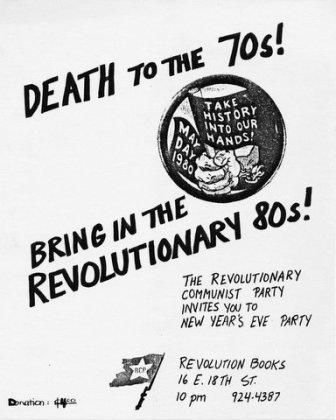
Of the major mass movements of the early ’80s, most were not Left-led. The NCM played a marginal role in the enormous rally against the arms race in 1982. The South African ANC played a leading role in the anti-apartheid divestment movement, but their longtime ally the age-weary CPUSA failed to muster much outside support.
There was a bump in far left activity in the solidarity movements for the new Sandinista government in Nicaragua, and the FMLN guerrilla movement in El Salvador. The pro-Deng, pro-Gang of Four, or pro-Hoxha groups all kept their distance for the most part, unable to square their hostility toward Cuba and the USSR with the politics of the Central American Left.
In the next few years the NCM declined further. The largest group, the Communist Party (ML), broke out into factions, as their growth and unity efforts stagnated, and key figures began to question Marxism-Leninism in any form. CPML rapidly disintegrated in 1982, despite efforts by the Revolutionary Workers Headquarters to head off the crisis.
In its wake, the League of Revolutionary Struggle emerged as the largest pro-China group. Initially formed as a merger of groups based in various Asian and Latino community-based groups, they merged with the African American community-based Revolutionary Communist League, with roots in the black nationalist movement.
The Communist Workers Party made an unusual double turn away from China, upholding the Cultural Revolution while breaking from the Maoist “Soviet capitalism” position. With this position, and their revival of demands for “peace” and “democracy”(which once would have been dismissed as “revisionist”), they briefly tried to orient toward the anti-dogmatist Trend, but their sectarian history proved too big an obstacle to joining any serious regroupment effort. Harry Haywood, a key figure linking the NCM with the CPUSA in its heyday, also abandoned the “Soviet capitalism” position before his death in 1985.
The Proletarian Unity League tried to regroup both pro-China and Trend groups around a rejection of left sectarianism. They merged with Revolutionary Workers Headquarters in 1985 to form Freedom Road Socialist Organization, which has since incorporated a number of smaller NCM groups, continuing an orientation to the “Black Belt nation” and non-sectarian work in mass movements.
The pro-Albania current was short-lived. By the time of Enver Hoxha’s death in 1985, the remaining group of any size, the Marxist-Leninist Party, had dropped its identification with Albania.
Meanwhile, the Trend saw no peace. The Organizing Committee for an Ideological Center collapsed first, which left Line of March the largest anti-dogmatist group. LOM became more outspoken in its critique of Maoism, first for China’s rapprochement with Washington. Then, following the violent Vietnam-China breakup, LOM took up the Vietnamese CP’s more all-sided critique of the Chinese CP’s class stand, the Sino-Soviet split, and Mao Zedong Thought in its philosophical aspects. With the rise of Gorbachev and glasnost and perestroika in the USSR, LOM actually outdid the CPUSA in its support for the new CPSU leader and direction. MINP-El Comité split, with one group eventually merging with American Workers Party, a small, secretive group on the fringes of the Trend. Both groups quietly disappeared.
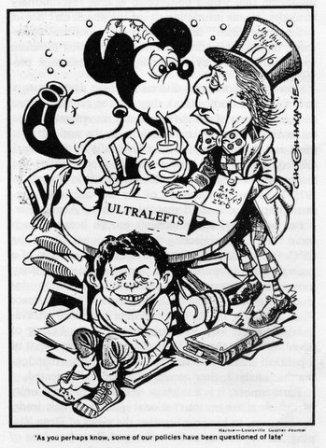
Some of the remaining groups relinquished the “vanguard party” model at the end of the decade. The Communist Labor Party became the National Organizing Committee (which in turn became League of Revolutionaries for a New America in 1993). The CWP became the New Democratic Movement. LOM became Frontline Political Organization (FPO). LRS split, with one group forming the Unity Organizing Committee, and another, the Socialist Organizing Network, which later merged with FRSO.
Several successful mayoral races involving left-leaning African American candidates sparked the Jesse Jackson presidential campaigns in 1984 and 1988. For some the NCM groups, including LRS, CLP, CWP, LOM and FRSO, the question of whether or not to support Democratic Party candidates in certain cases was settled by the rallying to Jackson of people of color, peace forces, and some in labor. Other groups continued the 1970s practice of boycotting elections. Two local groups, Democratic Workers Party in northern California and New Jersey Workers Organization, attempted electoral work independent of the two major parties, which generated some attention to their programs.
At the end of the 1980s, China had long since abandoned alliances with tiny parties of loyalists. As Communist governments collapsed, including Albania, national boundaries shifted drastically. The NCM in decline came up against the international crisis of the left. The Guardian closed shop in 1992. FPO (LOM) joined with an ecumenical left group in the Bay Area around the magazine North Star Review, to launch the left unity-oriented CrossRoads magazine, which did not outlive the decade. Theoretical Review folded in 1983, declaring that, with the collapse of the ant-dogmatist wing of the NCM, a sufficient base for rebuilding the US communist movement on new foundations had disappeared.
A few groups from the lineage continue in the 2010s, including the RCP, LRNA, two groups using the name FRSO after a split, and the Kasama Project, formed in part in response to criticisms of the RCP. Revolutionary Organization of Labor is a successor to an early, pre-Cultural Revolution anti-revisionist group, Hammer and Steel.
The experiences of the NCM’s rise and peak are still a reference point for young radicals, and historical studies and political discussions on those experiences have just begun. Positive and negative lessons continue to have weight and meaning for new generations.
Tirana Builds an Internationale Part One: The Struggle Against Modern Revisionism; Part Two: The Albanian Intervention; Part Three: Rally for Enver; Part Four: After Enver by woodsmokeblog
What Went wrong? Articles and letters on the U.S. communist Left in the 1970’s Edited and introduced by Charles Sarkis
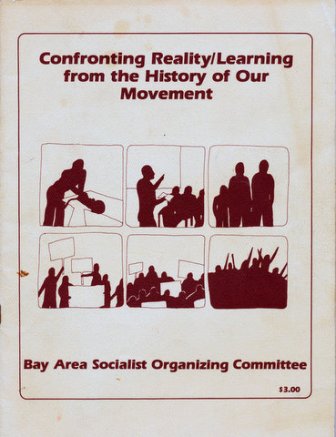
A Twenty-Year Legacy of Ultra-Leftism by the Bay Area Socialist Organizing Committee
Ex-Maoists on the Road to Moscow: Where is the “Trend” Going? from the Workers Vanguard
The New Communist Movement: An Obituary by The Movement for a Revolutionary Left, Eugene, Oregon
Confronting Reality/Learning from the History of Our Movement by the Bay Area Socialist Organizing Committee
Avakian Flees, Klonsky Deposed: End of the Line for American Maoism from the Workers Vanguard
Big upheavals in U.S. communist movement by In Struggle!
Personal Reflections on the Asian National Movements by Philip Vera Cruz, Lillian Nakano, Happy Lim, Lori Leong, May Chen, Alan Nishio and Wes Senzaki
China and Its Supporters Were Wrong about USSR by Harry Haywood
The Ghettoization of the U.S. Left: Living in the Material World of the 1980s by Charles Kaften
Where have all the party-builders gone? by John Trinkl
Amid partybuilding’s ruins: What went wrong? by John Trinkl
Not the time for a Leninist party? by John Trinkl
Who Do You Mean When You Say ’Maoist ’? by Mae Ngai
Maoism in the United States by Max Elbaum
Some Lessons from the Family Tree of the New Communist Movement by Dennis O’Neil
Response to Dennis O’Neil by Max Elbaum
Response to Max Elbaum by Dennis O’Neil
Second Response to Dennis O’Neil by Max Elbaum
Toward a Critical Reassessment of Maoism by Khalil Hassan
What Maoism Actually Stood For by Max Elbaum
Khalil Hassan Responds to Max Elbaum
Freedom Road Editors Respond to Max Elbaum
Two Veterans of the New Communist Movement Look Back
They Wanted to Serve the People: Chicanos and the Fight against National Oppression in the New Communist Movement by Bill Gallegos
[Back to top]
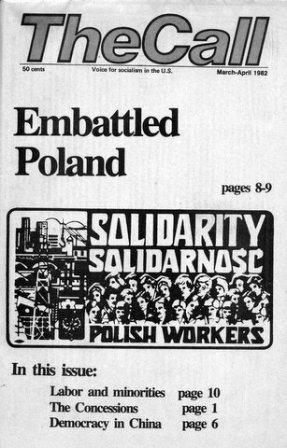
Summing Up the CPML’s Experiences in Trade Union Work by Charles Costigan
What is happening to the Communist Party (ML) of the USA? by the Workers Communist Party (Marxist-Leninist) [Canada]
Lessons from the Collapse of the Communist Party (Marxist-Leninist) by Carl Davidson
Dogmatism, social-democracy and the destruction of the CPML by J.R. Hammond and D. Wayne
The CPML and the tasks of Marxist-Leninists today by Carl Davidson
Once as Tragedy: A Critical History of the October League (Marxist-Leninist) by redweldor
The Call goes monthly: Why and what now? by Anita Fecht
A Message to the Movement by Jim Hamilton
Readers Critique Hamilton ’Message to Movement’: ’What do we discard and what do we keep?’ by D. Wane
Readers Critique Hamilton ’Message to Movement’: ’Views are road to further disintegration’ by Susan K.
’CPML’ on the Verge of Dissolution by the Marxist-Leninist Party
More on Hamilton debate by An RWH member, Chicago, Ill.
’CPML’ Debates How to Liquidate by the Marxist-Leninist Party
Once More On Hamilton by A former Seattle comrade
Criticize errors, uphold Mao by E.B. (Chicago)
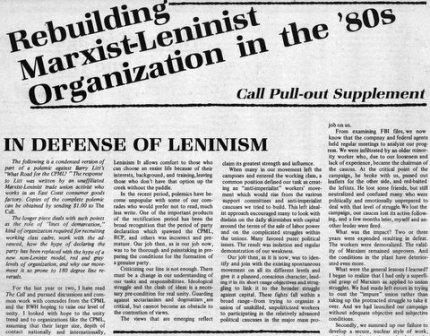
Southern Reader on Debate in CPML by Delta Dawn
Responses from SCEF: ’Without an organization there is no hope’ by Eva McMillan, President of SCEF
Responses from SCEF: ’SCEF has made mistakes but does valuable work’ by SCEF Staff
What Is the Way Forward? Opinions from the Ranks: We need a party structure by S.C. Hammond
What Is the Way Forward? Opinions from the Ranks: Sink roots, build bases
Letter: Don’t talk half socialism by J.V., San Francisco
Letter: Problem not ultra-leftism [and Call response]
A Marxist-Leninist looks at social democracy by Robert W. Hanson (Revolutionary Workers Headquarters)
Letter: Don’t sock Social Democrats so hard [and Call response]
The CPML Congress–The struggle for unity by W. Jean-Pierre
From the Second CPML Congress: Building Black United Fronts by Komozi
From the Second CPML Congress: The Chicano question by Babu, For the Afro-American commission
* * *
’What the “right” [in the CPML] is calling for’: Which way for our movement? by Barry Litt
USSR: Capitalist or Socialist? by Ben Phillips
Letter from the Editor: Where is The Call going? by Michael Moran, Call Editor and RWH member
[Back to top]
League Interview on Party Building by the League of Revolutionary Struggle (M-L)
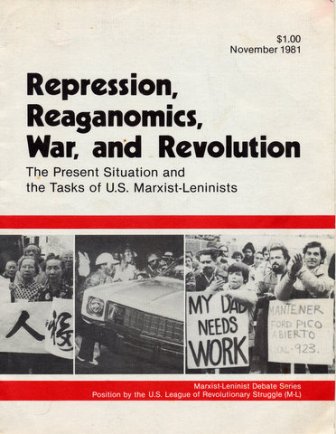
A Message to the Movement by Jim Hamilton
Readers Critique Hamilton ’Message to Movement’: ’What do we discard and what do we keep?’ by D. Wane
Readers Critique Hamilton ’Message to Movement’: ’Views are road to further disintegration’ by Susan K.
More on Hamilton debate by An RWH member, Chicago, Ill.
Response to Jim Hamilton of the CPML by Robert Morgan [League of Revolutionary Struggle (M-L)]
Once More On Hamilton by A former Seattle comrade
Criticize errors, uphold Mao by E.B. (Chicago)
The Crisis in Marxism and M-L Unity by John Martin, Member of the CPML Interim Political Committee
Fight on Two Fronts: Don’t exclude the LRS by S.M., Boston
What path to Marxist Leninist unity? A response to John Martin of the CPML by Mae Ngai [League of Revolutionary Struggle (M-L)]
Martin responds to LRS: Joint practice and discussion key to M-L unity
LRS misquoted, The Call apologizes
Build the Black Liberation Movement by the Revolutionary Workers Headquarters
RWH position on national question. Black liberation: a just struggle in its own right by Harry Quinn
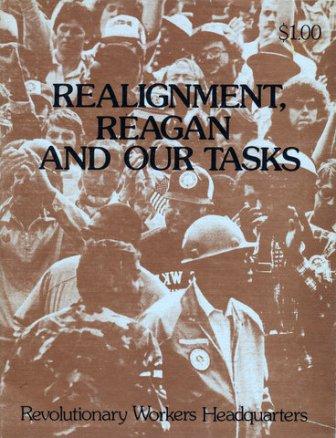
Black Liberation in the ’80s: Black Marxists meet in Detroit by W. Jean-Pierre
Repression, Reaganomics, War and Revolution. The Present Situation and the Tasks of U.S. Marxist-Leninists by the League of Revolutionary Struggle (M-L)
Realignment, Reagan and Our Tasks by the Revolutionary Workers Headquarters
A Critique of RWH’s “Realignment, Reagan and Our Tasks” by Jane Fong [LRS]
The anti-Reagan front and the tasks of our Trend by J.R.H., a CPML Central Committee member
Interview with RWH leader: The struggle for M-L unity
The debate on period and tasks: A review by an RWH member by Wes Harding
A response to Wes Harding of the Revolutionary Workers Headquarters by Jane Fong, for the League of Revolutionary Struggle (M-L)
Letter to the Editor: Where should communists concentrate?
UNITY Supplement on Responses to the Debate on Period and Tasks
Build the Black Liberation Movement
RWH position on national question. Black liberation: a just struggle in its own right by Harry Quinn
RWH on the Black Liberation Movement: Wrong Again! by Amiri Baraka (Including “Notes on Baraka's ’RWH on the BLM: Wrong Again’ From a White Communist” By Jim Woods)
* * *
Successful Left Unity by the Freedom Road Socialist Organization
[Back to top]
Upheaval in Poland: Workers Struggles Exposes Capitalism in Soviet Satellite [Revolutionary Communist Party]
Strike wave shakes Polish regime by the League of Revolutionary Struggle (M-L)
Fight On, Polish Workers! by the Communist Workers Party
Polish Strike Scores Advance for Working Class by Dave Brand [Communist Party USA/Marxist-Leninist)]
Poland: ’A Bitter Cup Overflows’ by Anna Schultz [Communist Party (Marxist-Leninist)]
A Lesson from Poland [Proletarian Unity League]
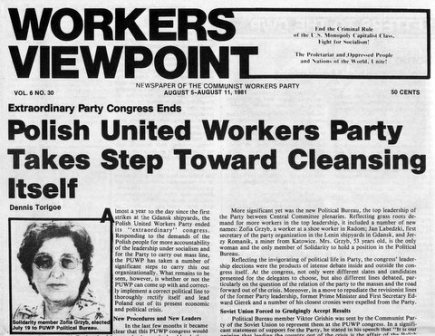
Polish Workers’ Strike ... More Meat and Democracy by Ron Whitehorne [Philadelphia Workers Organizing Committee]
The Polish Working Class Stands up by Dennis Strawn [Revolutionary Political Organization (M-L)]
Polish Strikers Jolted World by the Revolutionary Communist Party
Poland’s historic strikes: an indictment of Soviet-style socialism by the League of Revolutionary Struggle (M-L)
The Polish Workers Uprising and the Question of the Main Enemy [Ray O. Light]
New Polish showdown in the making by the League of Revolutionary Struggle (M-L)
First-Hand Account from Poland: In the Eye of the Storm by the Revolutionary Communist Party
Class Struggles in Poland by Paul Costello [Theoretical Review]
New Upsurge in Poland by the Revolutionary Communist Party
Poland: The Struggle Continues [Proletarian Unity League]
Kremlin hard pressed by protracted Polish struggle [League of Revolutionary Struggle (M-L)]
UNITY Editorial: Soviet Union – Hands off Poland! [League of Revolutionary Struggle (M-L)]
The Polish Workers’ Movement and “Red” Imperialism [Bolshevik League of the United States]
Which Way Out for Poland? Polish Workers Fight Revisionist Line, Part I, by Dennis T. Torigoe [Communist Workers Party]
Which Way Out for Poland? Part II, by Dennis T. Torigoe [Communist Workers Party]
Extraordinary Party Congress Ends: Polish United Workers Party Takes Step Toward Cleansing Itself by Dennis Torigoe [Communist Workers Party]
Which Way Out for Socialist Poland? Workers Struggle Against Polish Party’s Revisionist Line by Dennis T. Torigoe [Communist Workers Party]
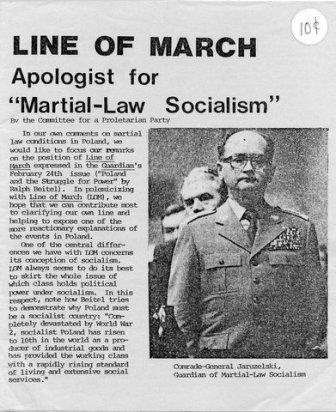
The capitalist-revisionist system has brought disaster to the Polish people [Marxist-Leninist Party]
Poland: Clampdown that May Blow Up by the Revolutionary Communist Party
Support the Rebels in Poland, Forward with the World Revolution by the Revolutionary Communist Party
Polish workers to generals: “You haven’t won yet!” [League of Revolutionary Struggle (M-L)]
Polish People Can Win [New Voice]
Poland and the Politics of the Two Superpowers [New Voice]
Editorial Statement on the Crisis in Poland [Theoretical Review]
Turning Point in Poland [Line of March Editorial Board]
Polish People Can Win by the League for a Labor Republic [The New Voice, Vol. X, No 13, February 15, 1982]
Poland and the Politics of the Two Superpowers by the League for a Labor Republic [The New Voice, Vol. X, No 13, February 15, 1982]
Poland and the struggle for power by Ralph Beitel [Line of March]
Poland is Socialism? [Committee for a Proletarian Party]
Line of March: Apologist for “Martial-Law Socialism” [Committee for a Proletarian Party]
Poland and the World Crisis of Revisionism [Marxist-Leninist Party]
Poland and the “Military Road to Socialism” [Theoretical Review]
On Poland: A Reply Against the Current, Vol. 2, No. 1 Winter 1982
Class Struggles in Poland, 1945-1956 by J. Kremenski [Theoretical Review, January 1983]
[Back to top]
UNITY New Year editorial: Our tasks in 1981
League Interview on Party Building
Learning from the life of Harry Wong
New study series to start: Study Marxism-Leninism Mao Zedong Thought!
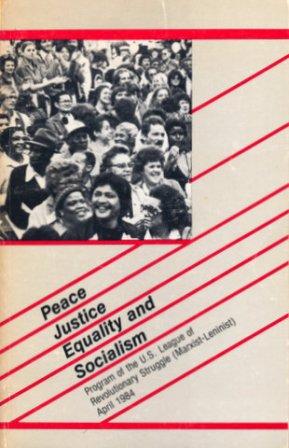
Response to Jim Hamilton of the CPML by Robert Morgan
What path to Marxist Leninist unity? A response to John Martin of the CPML by Mae Ngai
Martin responds to LRS: Joint practice and discussion key to M-L unity
LRS misquoted, The Call apologizes
RWH on the Black Liberation Movement: Wrong Again! by Amiri Baraka (Including “Notes on Baraka's ’RWH on the BLM: Wrong Again’ From a White Communist” By Jim Woods)
Opinion: Why I became a communist
Marxist-Leninist Study: Questions and answers from UNITY
Nationalism, Self-Determination and Socialist Revolution by Amiri Baraka
Marxist-Leninist Revolutionary Theory: Its Relation and Application to the Third World and African Americans by Amiri Baraka
CWP on Vincent Chin case: An ugly act of self-exposure
Editorial: Significance of League Congress
League of Revolutionary Struggle (Marxist-Leninist) Holds Second Congress
“Delegates to LRS Second Congress speak”
* * *
Lessons from the Collapse of the Communist Party (Marxist-Leninist) by Carl Davidson
Editorial: Unity makes some changes
Who Do You Mean When You Say ’Maoist ’? by Mae Ngai
Dogmatism, social-democracy and the destruction of the CPML by J.R. Hammond and D. Wayne
The CPML and the tasks of Marxist-Leninists today by Carl Davidson
Dr. King’s birthday and the Black struggle for democracy by Amiri Baraka
Interview with a Chicano communist: ’Chicanos must unify to meet the challenges of the 80’s’
Building the UAW: How the CPUSA won the battle and lost the war by Peter Shapiro
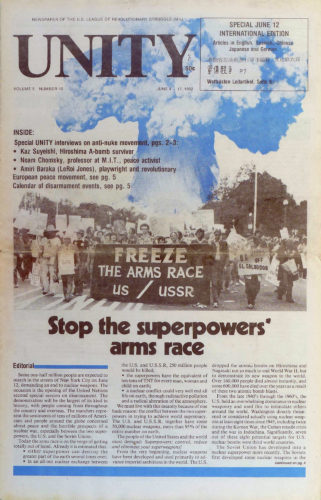
Malcolm X and Black leadership today by Michael (Pili) Simanga
San Francisco Jewish Film Festival: The Search for Jewish identity
Letter to the Editor: Are Jews a nationality?
UNITY Editorial: Support Barbaro in the New York City elections
Weather Underground: Driving down a dead end street by George Tyler
Interview with the LRS (M-L): Asian Americans struggle for full equality and political power
A communist perspective on the Asian student movement by M.W.
“Education and Unity to Serve Aztlan”
Letter to the Editor: Bad jacket for Communist Workers Party
Editorial: Stop the superpowers’ arms race
Part of our revolutionary history: Los Siete de la Raza
What direction for the National Black United Front? by Kalimu Endesha
A communist view – Workers under attack: The struggle to close ranks by Tom O’Neil
Chicano liberation and 1984 by Bill Flores and Bill Gallegos
A program for Chicano Liberation
The Right to Earn a Living: A program for the unemployed movement
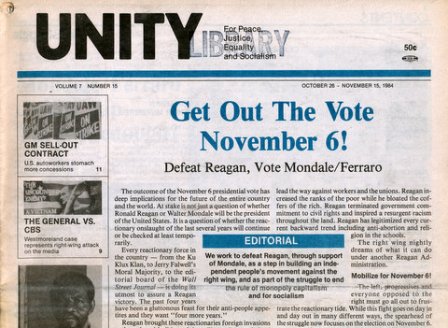
Run Jesse Run! by Amiri Baraka
On the Jesse Jackson campaign to date by Amiri Baraka
The Jackson Campaign, Nationalism and Self-Determination by Amiri Baraka
The Need for a Rainbow Agenda. Force the Democrats to Negotiate by Amiri Baraka
The Jackson Campaign Prepares for the Democratic Convention by Jean Yonemura
The left, the Jesse Jackson campaign and the 1984 election by Anne Adams
Moving Toward Higher Ground: The Politics of Jesse Jackson and the Rainbow Coalition by Shelly Ross
What did the revisionists conclude from their fiasco in the elections? by the Marxist-Leninist Party
* * *
Mondale campaign tries to get off the ground by John Ota and Anne Adams
Editorial: Get Out The Vote November 6! Defeat Reagan, Vote Mondale/Ferraro
Reagan’s electoral landslide forces Democrats to regroup by John Ota
Editorial: Strengthen the anti-Reagan front
Book Review: What Can We Learn from the CPUSA’s History? by Peter Shapiro
A response to another Frontline attack: Who is “unreliable” in the U.S. anti-intervention movement? by Sarah Johnston
The dam bursts in Watsonville. 2,000 Mexicano and Chicano workers take the lead by Bill Flores
Lessons of Watsonville by Peter Shapiro
The Watsonville Canning Strike, 1985-1987 by Peter Shapiro
he Necessity of Organization: The League of Revolutionary Struggle and the Watsonville Canning Strike by Peter Shapiro
Letter from the League of Revolutionary Struggle to Unión del Barrio
Position Statement: Self-Determination for the Chicano Movement: A Critique of the League of Revolutionary Struggle by Unión del Barrio
A Response to Unión del Barrio by Gilbert Sanchez, Jr. for the League of Revolutionary Struggle
Organizational Tenets of Aztlan: Contrasting MEChA and the League of Revolutionary Struggle by Stephanie A. López
Position Paper on the League of Revolutionary Struggle by San Diego County Central MEChA
* * *
Fighting sectarianism in the U.S. anti-apartheid movement by Karega Hart
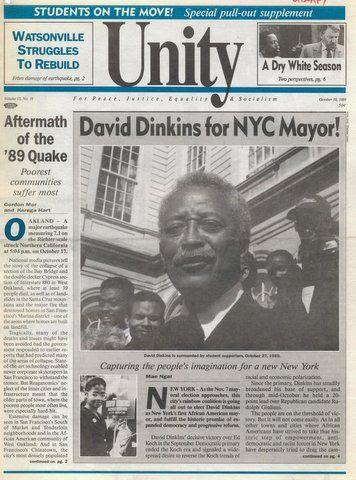
What lies ahead for the nuclear freeze campaign? by Carl Davidson
A Future to Win: The Student Movement and the 1980s
Hormel, labor unity and the role of the left by Peter Shapiro
A personal history of the Chicano student movement by Bill Flores
Battling for unity at National Chicano Student Conference: Cultural nationalists disrupt conference by Rosa Vega
The “Sunbelt Strategy” and Chicano Liberation by William Gallegos
Reagan and Salt II: Administration united on goal of nuclear superiority by Carl Davidson
Black Power Twenty Years Later by Amiri Baraka
Internationalism vs. LOM’s left-wing chauvinism by Sarah Johnston
Labor in Reagan’s U.S.A: Interview with Roberto Flores of the League of Revolutionary Struggle
Iran-contra scandal and the “Reagan revolution” by Carl Davidson
African Americans and The African Revolution by Amiri Baraka

Jesse Jackson calls for justice and economic revival by Fahamisha Brooks
Jackson front-runner in all regions by Jane Barth
Jesse Jackson surges to the top by Amy Weber
Super Tuesday and the African American National Question by Amiri Baraka
Hope Grows Nationwide as Jackson Leads by Jamala Rogers
Jesse 88 by Amiri Baraka [Forward, Vol. 8, Nop. 1, Spring 1988]
Chicanos and Jesse Jackson by Bill Gallegos
’We the People Can Win!’ Jackson campaign forging new democratic majority by Jamala Rogers
Special Unity Supplement: Elections ’88
Jackson emerges from DNC stronger for the future by Mae Ngai and Karega Hart
* * *
Editorial: Defeat Bush/Quayle! Vote for Dukakis and the the Democratic ticket
Left lukewarm about Dukakis by John Trinkl
How do we build opposition to Bush? by William Gallegos
Moving ahead to liberation: Learning from the past by Tim Thomas
Challenges for the Left in Electoral Politics: Looking to the 1990s by Mae Ngai
Kremlin hard pressed by protracted Polish struggle
China readjusts her industry Contributed by Jack Leonard
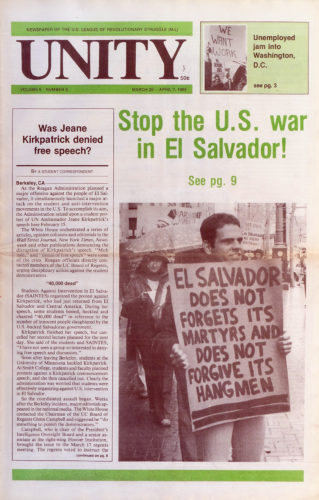
UNITY interviews Ranjbaran Party member: Changing situation in Iran
Soviet imperialism: A ’paper bear’? by Belle Anders
Polish mass movement pushes party toward reform
New stage in Kampuchean people’s war
Internationalism, China and communists in the U.S.
Polish workers to generals: “You haven’t won yet!”
Afghanistan: 2 years of occupation, 2 years of resistance
Soviets back genocide in Eritrea
Letter to the Editor: A reader asks about Poland and socialist democracy
The League of Revolutionary Struggle talks about: The Salvadoran struggle and support in the U.S.
China’s foreign policy: The fight against hegemonism
Opinion: How Should Revolutionaries look at the nuclear freeze? by Carl Davidson
Commentary: Cuba: What Went Wrong? by Lorenzo Canizares
United States in the World Today: Special Series on U.S. Foreign Policy
Letter to the Editor: Is the USSR the main danger? [And Unity response]
Soviet economy – a system of exploitation by Bill Silverstone
Saluting the 90th anniversary of Mao’s birth by Michael Lee
China’s one-child policy helps liberate women by Amy Bailey
Aims of Reagan’s China visit thwarted by John Ota
Kampuchea: Viet Nam launches major attack by Cathy Cartright
Huber Matos and the Maoist Dilemma by Irwin Silber [Line of March]
Changes in China’s socialist system by Michael Lee
The Revolution in China’s Countryside by Tak Matsusaka
20,000 youth build ties of peace and friendship: 12th World Festival of Youth in Moscow by John Ota
Shakeup in China’s top leadership by Kenji Kobayashi
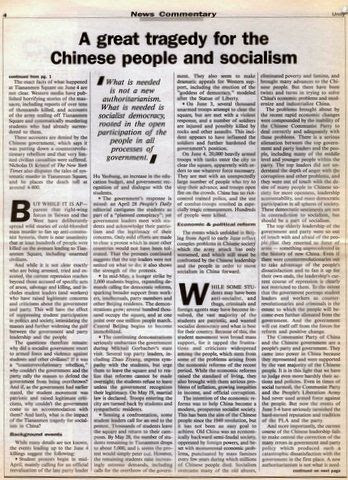
Mao Zedong – Great Chinese revolutionary by Oscar Rios
Students and socialism in China by Michael Lee
Winds of change in China and Soviet Union by Shelly Ross
Will Gorbachev succeed in his reforms? by Michael Lee
Lenin’s Conception of Socialism: Learning from the early experiences of the world’s first socialist revolution by Richard Fleming
Exclusive on-the-spot report: From Tiananmen Square by Karen Engst
Students rally in China marking an era of change by Michael Lee
Only capitalism can produce “hackers” by Mark Rudd
Socialism must improve the lives of the people by John Marienthal
On the mass line tradition of the Chinese Communist Party by Karen Engst
Commentary: A great tragedy for the Chinese people and socialism by Michael Lee
* * *
Unity Editorial: The October revolutions
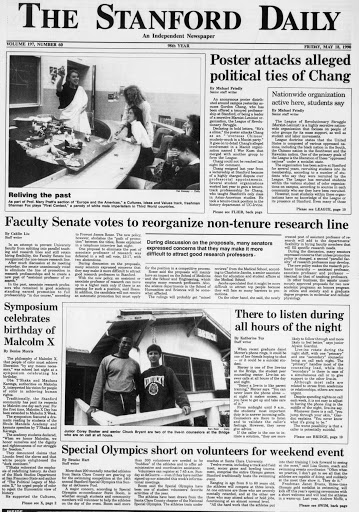
Poster attacks alleged political ties of Chang
Nationwide organization active here, students say
Story stigmatized communities, lacked substantiation
Article insinuates action, intentions without evidence
Daily staff members of color feel discrimination
League has played little-known role in campus politics
Letter: League’s members are not secretive about their identity
Creator of Chang flier comes forward in letter
Letter: League’s tactics have damaged MEChA, community
League recruitment deterred many. Secretive process alienated dozens who were approached
Letter: League’s tactics include threats
Letter: League has always been well-known
Viewpoint: Accusations were made without investigating complete story
Letter: League information was given out of concern for multiculturalism
Viewpoint: McCarthyite labels strip individuals of their humanity
Letter: Only when disease is diagnosed will healing begin
Letter: Citizens should not be forced to reveal their affiliations
Viewpoint: League members, unwilling to share power, malign opponents
Unity ’bridges gaps’ through broader goals
Why We Should Remain an M-L Organization by PS, East Bay [Peter Shapiro]
Statement on the Dissolution of the League of Revolutionary Struggle
Socialist Organizing Network Unity Statement
Marxists on Campus: Shedding Ultra-leftism to Build Student Movement
A Marxist-Leninist looks at social democracy by Robert W. Hanson (Revolutionary Workers Headquarters)
Build the Black Liberation Movement
RWH position on national question. Black liberation: a just struggle in its own right by Harry Quinn
RWH on the Black Liberation Movement: Wrong Again! by Amiri Baraka (Including “Notes on Baraka's ’RWH on the BLM: Wrong Again’ From a White Communist” By Jim Woods)
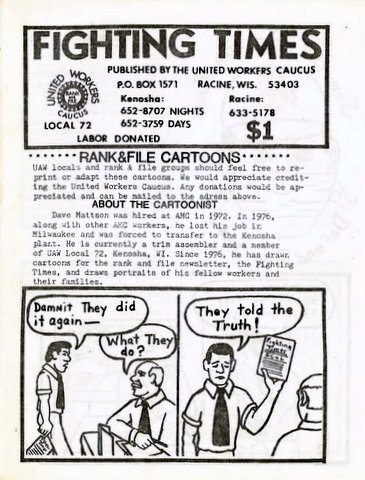
Fighting Times, December 1980
Fighting Times, February 1981
Fighting Times, Rank & File Cartoons
UAW Convention Report by Fightback
Running Hot, August 1980
Running Hot, December
Running Hot, January
Briggs Worker, March 1981
Briggs Worker, June 1981
Downtime, Vol. 1, No. 1, August 1981
Downtime, Vol. 1, No. 2, September 1981
Downtime, Vol. 1, No. 3, October 1981
[Back to top]
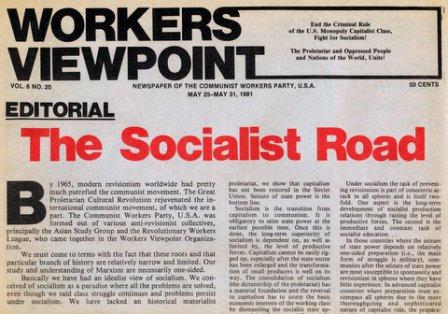
The Communist Workers Party underwent a dramatic evolution in the 1980s. It began in 1980 with the publication of CWP General Secretary Jerry Tung’s book The Socialist Road. Having previously been stridently Maoist, Tung now announced that both the Soviet Union and China were socialist countries. This theoretical shift also resulted in the CWP’s re-alignment within the New Communist Movement. As a CWP spokesperson explained it to representatives of Line of March, “The CWP is now squarely in the center of the anti-revisionist, anti-’left’ opportunist trend.”
This shift caused the CWP to reassess its activities, particularly in relation to electoral politics. In 1984 the party endorsed Jesse Jackson for president, and its members were extremely active in the Rainbow Coalition and the Jackson campaign nationally.
In July 1984, as part of its continuing evolution, the CWP stopped publishing its newspaper, Workers Viewpoint. At a convention in mid-1985, the CWP formally dissolved itself, subsequently creating in its place a new, non-Marxist-Leininist organization, the New Democratic Movement, devoted to establishing “local power bases.” The New Democratic Movement lasted only a few years before dissolving.
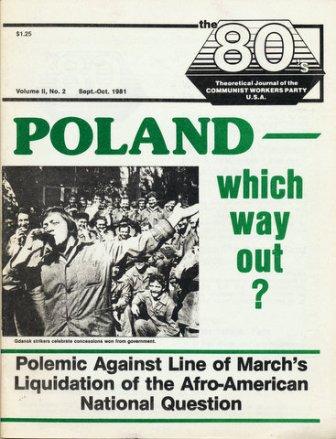
The NASSCO Workers Struggle: For a Fighting Union–A Communist Perspective by the Committee for a Proletarian Party
Why CWP Flip-flopped on Russia from the Workers Vanguard
Letter on the CWP’s Change of Line by the Line of March Editorial Board
On Jerry Tung’s Book ’The Socialist Road’. Maoist ’Three-Worlders’ Embrace Soviet Revisionism by the Marxist-Leninist Party
Communist Workers Party analyzes the history of socialism: Right questions, wrong answers by the Secretary for international affairs, Political Bureau, In Struggle [Canada]
Letter to the Editor: Bad jacket for Communist Workers Party from Unity newspaper
CWP on Vincent Chin case: An ugly act of self-exposure by the League of Revolutionary Struggle
Donkey Work for the Democrats: CWP Caboose on the Jesse Jackson Train from the Workers Vanguard
CWP: From Workers Viewpoint to Jesse’s Viewpoint from the Workers Vanguard
Maoism’s Latest Farce: The CWP Goes Shopping for American Express by Max Elbaum [Line of March]

Workers Viewpoint Editorial: The Socialist Road
Letter to the CWP: Material Incentives Needed Under Socialism
The Socialist Road. Character of Revolution in the U.S. and Problems of Socialism in the Soviet Union and China by Jerry Tung
Questions and Answers by Jerry Tung
Line of March’s United Front Against War and Racism – Strategy for What? by Phil Thompson
Excerpts from Political Report To the Fourth Plenary of the CWP Central Committee by Jerry Tung, General Secretary of the CWP
Line of March’s White Chauvinist, Anti-Worker Line on the African-American National Question by Phil Thompson [The 80’s, Vol. II, No. 2, Sept.-Oct. 1981
CWP Statement by Jerry Tung Concerning Albany Arrests [Workers Viewpoint, Vol. 6, No. 36, September 30-October 13, 1981]
Study Marxism: The Revolutionary Situation
Long Live the Communist Workers Party Five by the Central Committee, CWP
Help Keep the Workers Viewpoint Weekly by Robert Goldstein, editor
Study Marxism: Lenin on Party Building
The Communist Workers Party Stands For: [Workers Viewpoint, Vol. 8, No. 34, November 2-8, 1983]
Post-Industrial Society by Jerry Tung
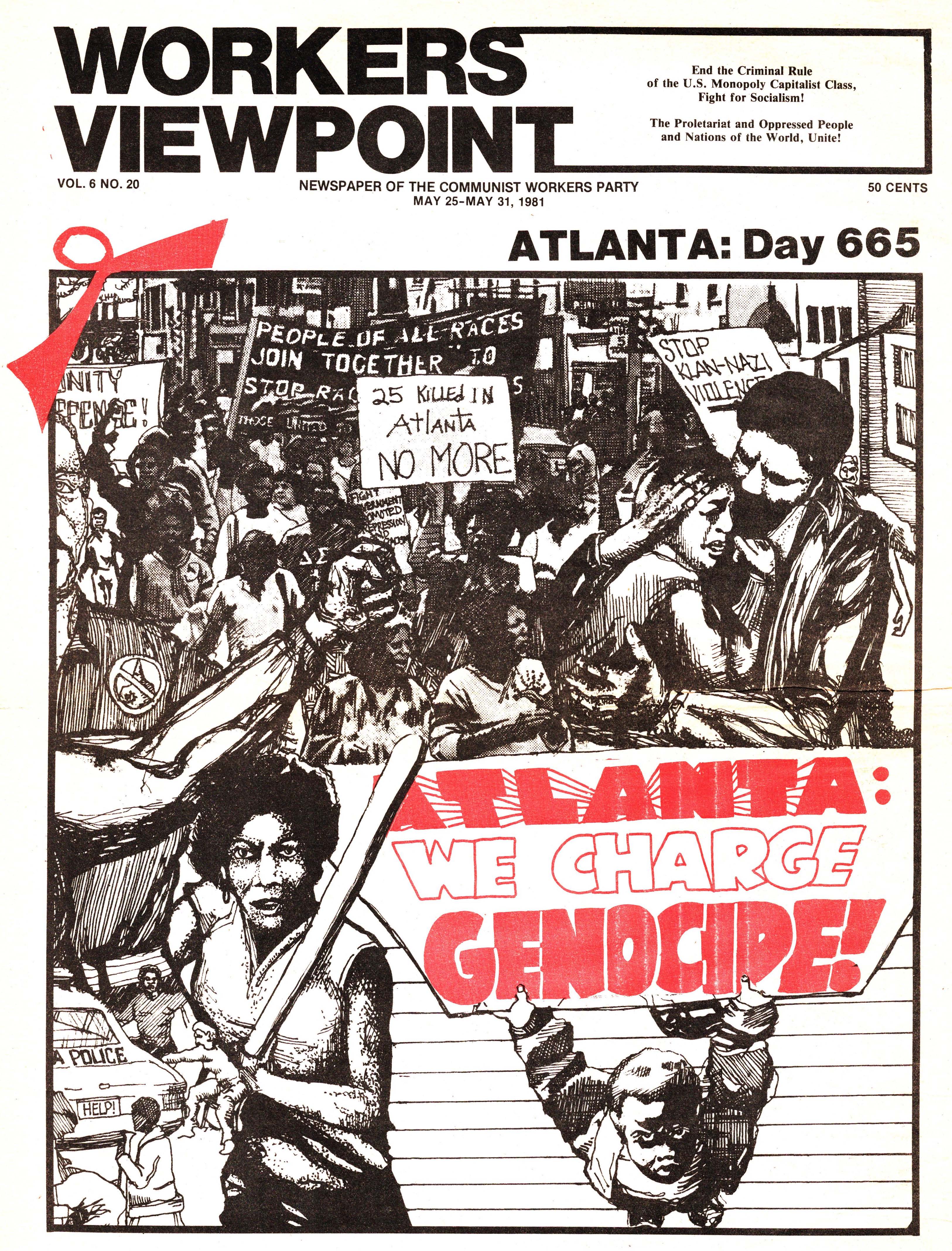
U.S. Labor Party Wallows Deeper by Gary Madison
Two Roads for Chicano Movement by a student
The Origins of the McCarthy Era Part I, Part II by Mary Quan
Letter to the CWP: Guerrilla Warfare Now?
Chomsky Promotes Anti-Semitism by Jerry Gladstone [Workers Viewpoint, Vol. 6, No. 32, September 2-8, 1981]
Capitalism Destabilized – Our Task by Phil Thompson and Dennis T. Torigoe
The Afro-American National Question Volume II
Line of March’s White Chauvinist, Anti-Worker Line on the African-American National Question by Phil Thompson [The 80’s, Vol. II, No. 2, Sept.-Oct. 1981 (theoretical journal of the Communist Workers Party]
AAFE Endorses Barbaro, Ross and Friedlander
Barbaro: The People’s Alternative to Koch by Jim Davis
Letter to the CWP: NY Elections, Barbaro and United Front Work
Reagan: The Second Time As Farce by Tom Whelan [The 80’s, Vol. II, No. 2, Sept.-Oct. 1981]
Editorial: Reaganomics Stalls, War Danger Delayed
U.S. Scrambling in 80s World Alignment. Part I by George Owens
The State of the Black Liberation Movement by Douglas Layne and Don Murphy
Water and Chicano Self-Determination
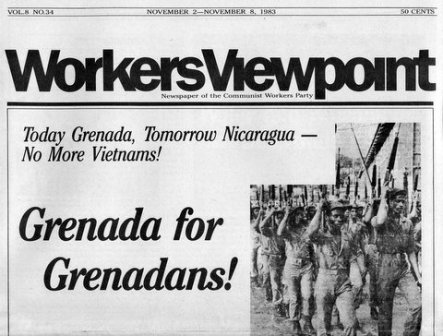
The French Elections And The Fight for Socialism by Robert Goldstein
Which Way Out for Poland? Polish Workers Fight Revisionist Line, Part I, by Dennis T. Torigoe
Which Way Out for Poland? Part II, by Dennis T. Torigoe
China: What Went Wrong at Boshan Steel by Cynthia Lai
“Labor to Power with Socialist Policies”: British Labor Party Tilts Left by William Nishimura
Retiring in Dignity: Miami or Moscow? by Jim Davis
What the Progressive Press is saying... Mao, China and Class Struggle [reprinted from the Guardian newspaper]
CPC Reverses Verdict on Soviet Revisionism – by Following Its Footsteps by Cynthia Lai
Line of March – Mouthpiece of Soviet Revisionism on the Cultural Revolution by Cynthia Lai
Extraordinary Party Congress Ends: Polish United Workers Party Takes Step Toward Cleansing Itself by Dennis Torigoe
Iran at the Crossroads by Robert Goldstein
Prospects Excellent for Iran’s Left by Robert Goldstein
Which Way Out for Socialist Poland? Workers Struggle Against Polish Party’s Revisionist Line by Dennis T. Torigoe
Support for the NCR: Statement of the Communist Workers Party, USA
Historic Lessons of China’s Cultural Revolution by Cynthia Lai
Workers Viewpoint [newspaper]
[Back to top]
The crisis which paralyzed the OCIC as a result of the campaign against white chauvinism, launched in 1980 showed no signs of abating as members began to leave in droves. In October, an Open Letter to the Party Building Movement was published, signed by former OCIC members from around the country. The OCIC national leadership was unrepentant, accelerating the campaign while denouncing opponents as “racists” and “petty bourgeois chauvinists.”
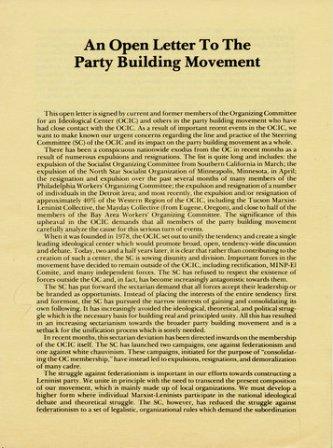
Ex-OCIC members were unable to agree on the causes of this crisis. Some, including Line of March and the Theoretical Review, argued that the OCIC was a crisis of the fusion party-building line. Others argued that the fusion line was sound, but that the OCIC had never applied it to building the organization.
During 1981 every OCIC activity except the campaign ground to a halt and PWOC’s Organizer newspaper had to admit that the OCIC was “near-collapse” with “functioning local areas reduced from 18 to 6 and 80% of the membership resigned.”
PWOC itself was also in shambles, torn apart by internal witch hunts and charges of “ultra-leftism” against the leadership by angry former members. 80% of its membership resigned as well.
By the spring of 1982, both PWOC and the OCIC were defunct.
The White Chauvinism Campaign and Political Line by Bob K., the Boston Political Collective (Marxist-Leninist)
An Open Letter To The Party Building Movement by former members of the OCIC
Speech on the Degeneration of the OCIC by Charles Kaften
The White Chauvinism Campaign and the Crisis of the Fusion Line by the Boston and Tucson Theoretical Review Editorial Boards
Letter of Resignation, Baltimore/Washington OCIC
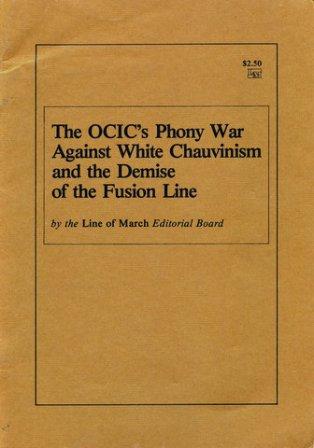
The Second Crisis of U.S. Anti-Revisionism by Clay Newlin
Split in the Atlanta Local Center, OCIC
Racism, White Chauvinism and the FBI: A Critique of Petty Bourgeois Moralism by The Movement for a Revolutionary Left, Eugene, Oregon
“The OCIC’s White Chauvinism Campaign and its Lessons for U.S. Marxist-Leninists” by Jim Jacobs
The OCIC’s Phoney Campaign: Ultra-“Leftism” in Command Once Again by former members of the OCIC Boston Local Center
PWOC: Leading the left-sexist pack by Constance Scott
The OCIC’s Phony War Against White Chauvinism and the Demise of the Fusion Line by the Line of March Editorial Board
More on the Campaign against White Chauvinism by John Ziv
Open Letter to White Petit Bourgeois Comrades by John Haagland
What Happened to the OCIC? Parts 2 and 3: A Critique of the Ultra-leftism of the OCIC and Its Relationship to the Fusion Partybuilding Line. by Dave Forrest, Vickie Kawakami, Tyree Scott, and Beverly Sims
Accommodation to racism in the communist movement: Is Communism the Property of White Petit Bourgeois Intellectuals? by Michael Simmons
PWOC – “The New Dogmatists”? by J.B. and C.B.
Racism and the Decline of the OC by Clay Newlin
SNCC Re-evaluated: Racism in the Civil Rights Movement by Michael Simmons
The PWOC: Degeneration into Ultra-Leftism by former PWOC members
Letter to the Party Building Movement [on resigning from the OCIC] by the Southern California Local Center/OCIC
PWOC’s Ultra-Leftism by ex-PWOC members
Letter to Paul Costello by Dave Forrest
Invitation to the Tucson Marxist-Leninist Collective to participate in the national committee to organize regional conferences by Dave Forrest and Max Elbaum
Invitation to the Tucson Marxist-Leninist Collective to participate in the planning committee for regional conferences by Max Elbaum and Melinda Paras
Letter to the Tucson Marxist-Leninist Collective urging it to participate in the planning committee for regional conferences by Dave Forrest
Letter of resignation from the planning committee for regional conferences by Dave Forrest
Letter on the collapse of the initiative to organize conferences to summarize the demise of the OCIC by Max Elbaum, Melinda Paras and Sharon Rose
[Back to top]
Letter to Paul Costello by Dave Forrest
Letter from the Line of March Editorial Board to the Theoretical Review on LOM-TR Relations
Reply of the Theoretical Review Editorial Board to Line of March
Capitalism Destabilized – Our Task by Phil Thompson and Dennis T. Torigoe [Communist Workers Party]
Letter criticizing the Theoretical Review for having published the article, “Dirty Linen: The Struggle in the Bay Area MLEP“ by the Line of March Editorial Board
Capitalism, the State and Crises by Paul Costello
Toward a Contemporary Strategy: Lessons of the 1930s by Paul Costello
Communist Party Theory and Practice Among the Unemployed, 1930-1938 by Irene North
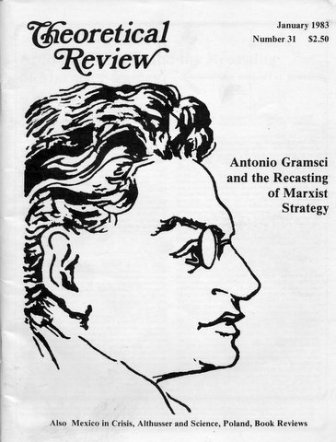
Bruce Springsteen: Reading Rock and Roll by Neil Eriksen [Neal Ullestad]
The Communist Party and the CIO by Ben Rose
Women’s Oppression in Capitalist Society: An Introduction
The Material Basis of Women’s Oppression in Capitalist Society by Jean Tepperman
Capitalist Restoration or Transition to Socialism? By Ira Gerstein
TR Editorial Statement on the Crisis in Poland
Letter from Solidarity’s Peter Drucker to the Theoretical Review Collective [on possible unity discussions]
On Poland: A Reply Against the Current, Vol. 2, No. 1 Winter 1982
Reaping the Whirlwind: Soviet Economics and Politics, 1928-32 by Paul Costello
Poland and the “Military Road to Socialism”
A Deafening Silence: Sexuality and the Leninist Left by Jeff Goldthorpe
The Concepts of Ideology, Hegemony, and Organic Intellectuals in Gramsci’s Marxism by Valeriano Ramos, Jr.
Antonio Gramsci and the Recasting of Marxist Strategy by Paul Costello
Glasnost must seek origins of present crisis in Soviet history by Paul Costello
Celebrating Native American Indian Lives – Indigenous Reggae Music in the United States by Neal Ullestad [Red Ink, Vol. 16, No. 1, Fall 2010]
Notes on Identity and Politics in the Native American Indian Hip Hop Community by Neal Ullestad
Theoretical Review
[Back to top]
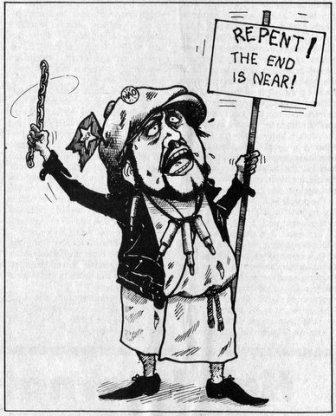
The Decline of the RCP: A Polemic by the Organization for Revolutionary Unity
Third Draft of Criticism of the RCP by the Maoist Internationalist Movement
Positive trends in the RCP? [from MIM Theory, No. 6, 1987]
RCP and “Refuse & Resist” are silent about NOW’s attacks on the movement [from the Workers’ Advocate Supplement, published by the Marxist-Leninist Party]
NAFTA Stand Clarifies RCP’s Differences with MIM [from the Maoist Internationalist Movement]
The Revolutionary Communist Party-USA And Trotsky: A Literal Comparison [from the Maoist Internationalist Movement]
Book Review: Avakian’s Democracy Can’t We Do Better Than That? [from the Maoist Internationalist Movement]
Revolutionary Communist Party “On the Question of Homosexuality and the Emancipation of Women” [from the Maoist Internationalist Movement]
What's Wrong with the RCP-USA by Majdur Travail
The RCP-USA, Maoism, and the Three Worlds Theory by Joseph Green
The RCP, the Theoretical Struggle and the Working Class by Frank, CVO
The Maoist cultism of the RCP is anti-Marxist by Eric Gordon
Nine Letters to Our Comrades. Getting Beyond Avakian’s New Synthesis by Mike Ely
Letter to the RCP on its document On the Position on Homosexuality in the New Draft Program by Dennis O’Neil
Our Summation of the Politics and Practice of the Revolutionary Communist Party, USA by the Organization of Communist Revolutionaries
Bob Avakian Speaks on the Mao Tsetung Defendants’ Railroad and the Historic Battles Ahead
Basic Principles for the Unity of Marxist-Leninists and For the Line of the International Communist Movement A Draft Position Paper for Discussion Prepared by the Revolutionary Communist Party, USA and the Revolutionary Communist Party of Chile
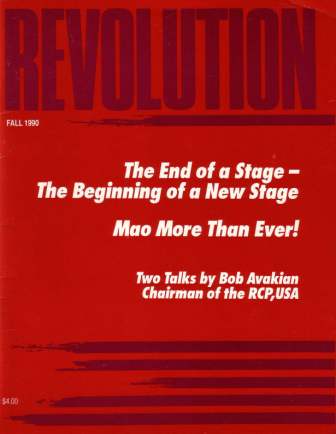
Why the U.S. Imperialists Are Watching the China Trial
Chiang Ching’s Defiant Declaration: It’s Right to Rebel! Making Revolution is No Crime!”
Charting the Uncharted Course. Proletarian Revolution in the U.S.!
New Programme and New Constitution of the Revolutionary Communist Party
On the Class Struggle in China [from A World To Win, Preliminary Issue, May 1981]
Outline of Views on the Historical Experience of the International Communist Movement and the Lessons for Today [from Revolution, Issue #49, June 1981]
On the Question of So-Called “National Nihilism”: You Can’t Beat the Enemy While Raising His Flag
Conquer the World? The International Proletariat Must and Will by Bob Avakian
Imperialist Economism, or the European Disease [from A World To Win, Preliminary Issue #2, May 1982]
If There Is To Be Revolution, There Must Be A Revolutionary Party by Bob Avakian
The Nature of the Soviet Union – An Urgent and Decisive Question
The Soviet Union: Socialist or Social Imperialist? Part II: Raymond Lotta vs. Albert Szymanski (Full Text of New York City Debate, May 1983)
The Science of Revolution: An Introduction by Lenny Wolff
U.S. Get Your Bloody Hands Off Grenada and Lebanon! [flyer]
U.S. Get Your Bloody Hands Off Grenada and Lebanon! [another flyer]
Notes Toward an Analysis of the Soviet Bourgeoisie by Lenny Wolff and Aaron Davis
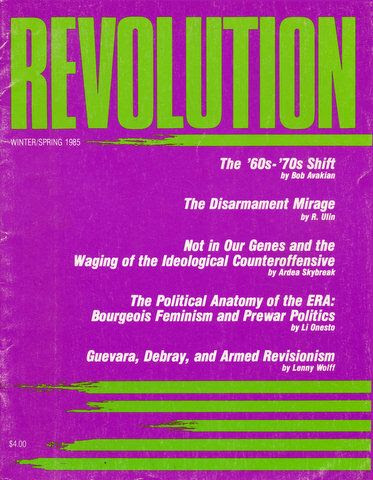
Jesse Jackson: The “Right Stuff” for U.S. Imperialism by Carl Dix
The Political Economy of Apartheid [from A World To Win, #3, 1985]
The ’60s-’70s Shift by Bob Avakian
Guevara, Debray and Armed Revisionism by Lenny Wolf
RCP,USA Celebrates 10th Anniversary [from A World To Win, #5, 1986]
Revolution in Imperialist Countries Requires Mao Tsetung Thought [from A World To Win, #7, 1986]
Commemorating a Major Struggle in the RCP, US. Upholding Mao’s Revolutionary Line: A Turning Point [from Revolution, #56, Spring 1988]
On the Question of Homosexuality and the Emancipation of Women [from Revolution, #56, Spring 1988]
Who’s Behind Iran/Contragate? A Conversation with Raymond Lotta [from Revolution, #56, Spring 1988]
When John Wayne Went Out of Focus: GI Rebellion and Military Disintegration in Vietnam by Nick Jackson [from Revolution, #56, Spring 1988]
The United States and Mexico: Anatomy of Domination by David Nova [from Revolution, #56, Spring 1988]
New Document from RCP, USA: Marxism-Leninism-Maoism [from A World To Win, #12, 1988]
Revolt in China: The Crisis of Revisionism, or...Why Mao Tsetung Was Right by Raymond Lotta
On the International Situation: New Twist in the Imperialist Knot [from A World To Win, #15, 1990]
Two Talks by Bob Avakian [Revolution, Fall 1990]
Snapshots: 25 Years in the Vanguard (part 1) [on the 25th anniversary of the founding of the RCP]
The Chicano Struggle and Proletarian Revolution in the U.S.: A Paper for Discussion
On the Position on Homosexuality in the New Draft Programme
Revolution magazine
[Back to top]
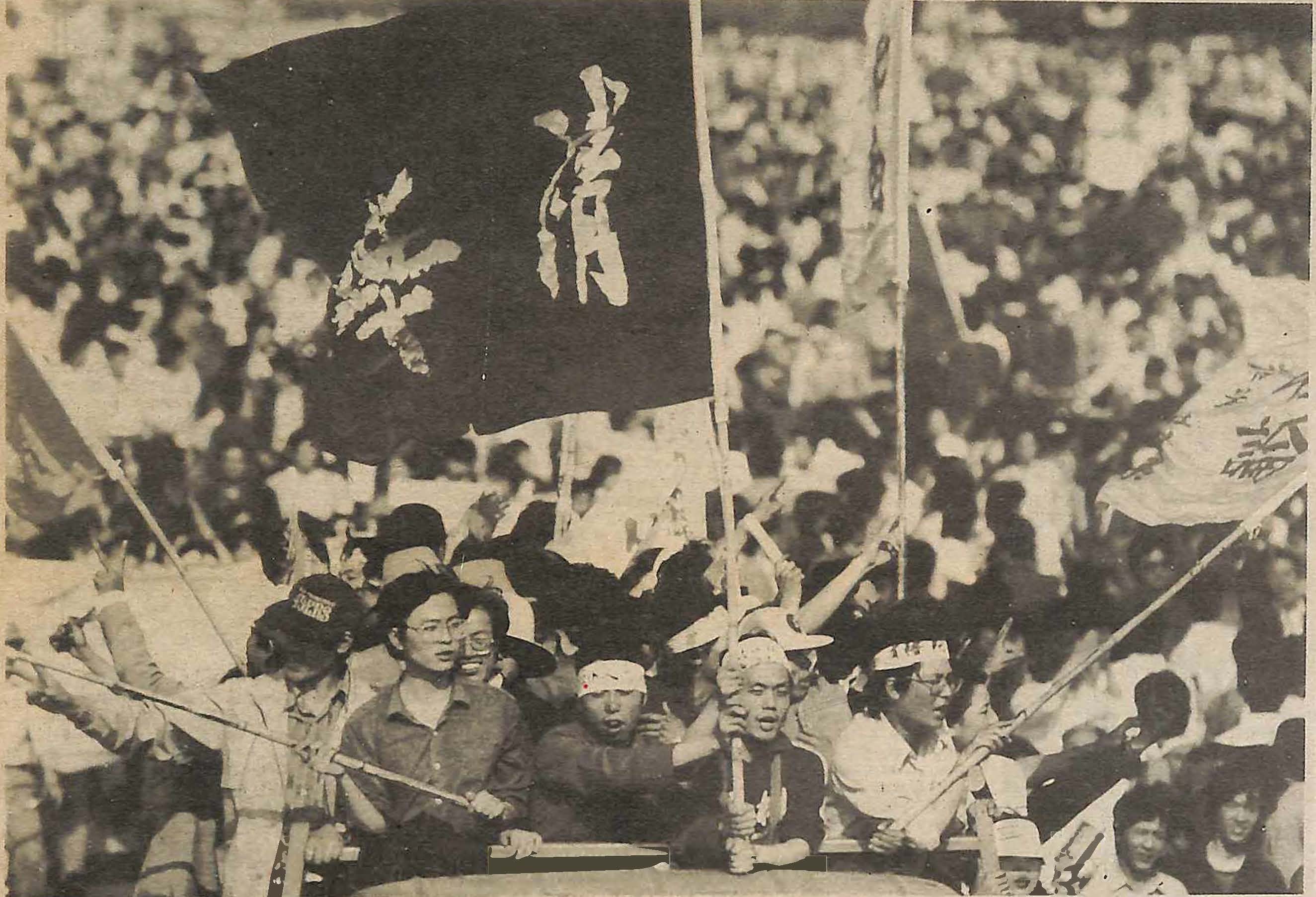
Message from Tiananmen Revolutionary Communist Party
Revolt in China: The Crisis of Revisionism, or...Why Mao Tsetung Was Right by Raymond Lotta, Revolutionary Communist Party
Exclusive on-the-spot report: From Tiananmen Square by Karen Engst [from Unity, League of Revolutionary Struggle]
Students rally in China marking an era of change by Michael Lee [from Unity, League of Revolutionary Struggle]
Only capitalism can produce “hackers” by Mark Rudd [from Unity, League of Revolutionary Struggle]
Down with the Blood-Soaked Capitalist Regime in China! Statement by the Committee of the Revolutionary Internationalist Movement (RIM)
RIM Press Conference Condemns Deng Regime
Frontline Editorial: Bloody China Crackdown a Setback for Socialism [Line of March]
Commentary: A great tragedy for the Chinese people and socialism by Michael Lee [from Unity, League of Revolutionary Struggle]
Socialism must improve the lives of the people by John Marienthal [from Unity, League of Revolutionary Struggle]
On the mass line tradition of the Chinese Communist Party by Karen Engst [from Unity, League of Revolutionary Struggle]
Condemn the brutal capitalist rulers of China! by the Marxist-Leninist Party
’No Mercy’ for China’s Democracy Movement by Max Elbaum [Line of March]
China Crackdown Sparks Diverse Response in World Communist Mv’t by Max Elbaum [Line of March]
Tiananmen: How Should The U.S. Left Respond? by Stan Woods [Line of March]
Chinese Fascism: The Deng Hits the Fan Progressive Labor Party [The Communist, No. 1, Fall 1989]
Tiananmen Square: What the Media Suppressed A World To Win, #14, November 1989.
Looking Back at Tianamen Square. The Defeat of Counter-Revolution in China by Mick Kelly [Freedom Road Socialist Organization]
[Back to top]
Bound Volume: Founding Documents of MIM, MIM Notes l-34, MIM Theory 1-13
Third Draft of Criticism of the RCP
Positive trends in the RCP? [from MIM Theory, No. 6, 1987]
Gender and Revolutionary Feminism [MIM Theory, Nos. 2-3, 1992]
NAFTA Stand Clarifies RCP’s Differences with MIM [from the Maoist Internationalist Movement]
The Revolutionary Communist Party-USA And Trotsky: A Literal Comparison [from the Maoist Internationalist Movement]
Book Review: Avakian’s Democracy Can’t We Do Better Than That? [from the Maoist Internationalist Movement]
[Back to top]
At the time of its founding in 1980, the Marxist-Leninist Party was in the process of breaking with its long-time mentor in Canada, the Communist Party of Canada (M-L) (CPC(ML)).
The break with the CPC (M-L) led the MLP to begin a reassessment of its own politics, partially in an attempt to draw other anti-revisionists towards it, partially in order to discover the roots of the deepening crisis of the international communist movement. Initially, the MLP’s line closely followed that of the Party of Labor of Albania. By the late 1980s, however, the MLP came to the conclusion that anti-revisionism meant that it had to reject the traditional support of the communist movement’s positions from the time of the 1935 Congress of the Comintern onwards.
This decision, however, led to an ideological impasse in the MLP, and at its fifth Congress in November 1993 the Party voted to dissolve itself. Among its successor organizations were the Chicago Workers’ Voice group, the Detroit Communist Voice group, and the Los Angeles Workers’ Voice group.
What Was the Marxist-Leninist Party? by Jake (Chicago)
Being Disliked by the “Major Players” Was to the MLP’s Credit! by Ben (Seattle)
Organizing in the Work Place, Part I: [MLP] Work in the Unions by Jake (Chicago)
Distortions in a history of the Marxist-Leninist Party, USA by Frank (Seattle)
On the Question of So-Called “National Nihilism”: You Can’t Beat the Enemy While Raising His Flag by the Revolutionary Communist Party
Against the National Nihilism of the “RCP,USA” by the Marxist-Leninist Party
“You Can’t Beat The Enemy While Raising His Flag”: MLPUSA Tries It by the Revolutionary Communist Party
Communique of the Founding Congress of the Marxist-Leninist Party of the USA
Documents of the Founding Congress of the Marxist-Leninist Party of the USA [Workers’ Advocate, Vol. 10, No. 1, January 1, 1980]
* * *
Chinese revisionists are die-hard opponents of the liberation struggle of the Salvadorean People
’CPML’ on the Verge of Dissolution
’CPML’ Debates How to Liquidate
* * *
On Jerry Tung’s Book ’The Socialist Road’. Maoist ’Three-Worlders’ Embrace Soviet Revisionism
Introducing the Correspondence Between the MLP,USA and the RCP of Britain (ML)
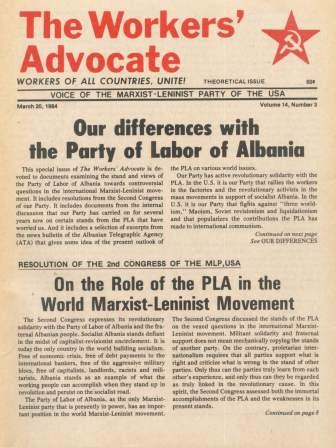
Documents of the Second Congress of the Marxist-Leninist Party, USA
Additional Congress resolutions [including On the Role of the PLA in the World Marxist-Leninist Movement]
Three additional Congress resolutions: On Problems in the Orientation of the International Communist Movement in the Period from the End of World War II to the Death of Stalin; On the Marxist-Leninist Classics; and Against Trotskyism [plus pre-Congress discussion materials]
* * *
Barry Weisberg’s ’CPUSA/ML’ denounces Marxism-Leninism and dissolves
Our Differences with the Party of Labor of Albania
* * *
Speech: On the Black National Question and the Right to Self-determination
Speech: On Nationality Organization
Speech: On the Black Panther Party
Speech: On the League of Revolutionary Black Workers
* * *
What did the revisionists conclude from their fiasco in the elections?
Revisionist CPUSA holds fast to the mistakes of the 7th Congress of the CI
Resolution on the black national question
* * *
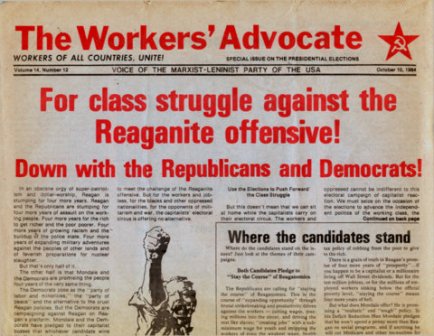
Underneath the stagnation, the stage is being set for renewed struggle [opening speech to the conference]
Speech: Drawing the working class into the political movement
Speeches: Trends in the strike movement; Our work in the 1985 Chrysler strike
Speech: The CPUSA’s work in auto and the change in line of the mid-1930’s
Speech: Building an in-plant distribution network at Great Lakes Steel
Speech: The defense of John Smith
* * *
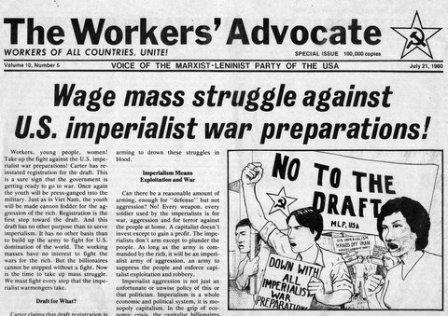
Following this path, the working class will construct a new world [opening speech to the Congress]
* * *
Chinese working people will rise again! Condemn the brutal capitalist rulers of China!
6,000 Albanians seek asylum in foreign embassies
Two articles from Swedish ’Red Dawn’ on the degeneration of the Soviet Union
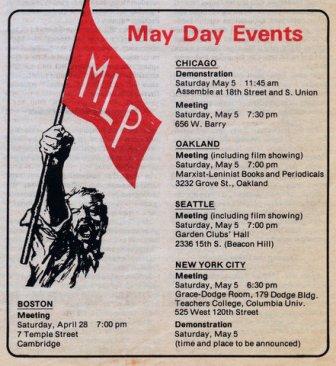
4th National Conference of the MLP,USA
Speech: On the Collapse of Revisionism
Speech: Some Questions of Soviet History: From the October Revolution to the First Five Year Plan
Speech: Some Theoretical Questions Concerning Soviet History
* * *
Gus Hall supports coup. CPUSA in crisis
The pretense is over: Riots in Albania
A split among reformists: CPUSA breaks apart
Marxist-Leninist Party Holds 4th Congress
Fifth Congress Votes to Disband the MLP, USA
* * *
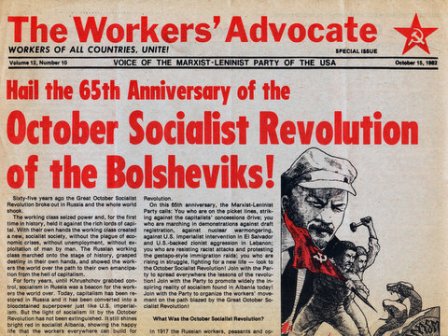
On the Seventh Congress of the Comintern
Between the Sixth and the Seventh Congresses [of the Communist International]
In Defense of the Leninist United Front Tactics
Against the Trotskyist critique of the Seventh Congress
Against Stalinist Revisionism. In Defense of Marxism-Leninism
The CPUSA’s Liberal-Labor Approach to the Critique of Browder
Why the CPUSA didn’t resist Khrushchovite revisionism
On the history of the CPUSA and the CI on the Right to Self-Determination
The CPUSA and the unemployed movement of the 1930’s
The CPUSA’s work in auto and the change in line of the mid-1930’s
The Degeneration of Soviet Socialism and the Turn of the Mid-1930’s
From Baba to Tovarishch. The Bolsehvik Revolution and Soviet Women’s Struggle for Liberation by Barbara Ranes
The Workers’ Advocate Supplement
Chicago Workers’ Voice Theoretical Journal
West Indian Voice No. 23, November 1983
[Back to top]
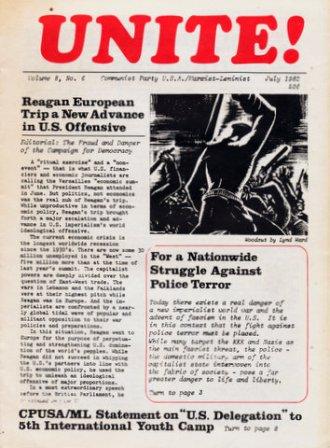
Counter-Revolution is Official Policy of Chinese State by Emily Keppler
The Illegal Party and Its Legal Work by Emily Keppler
The Fascist Menace in the United States and How to Fight It by Barry Weisberg
Build the Democratic Front Against Fascism and War! Unite!, Vol. 7, No. 8, May 1, 1981
To Build the Party: Sharpen the Class Struggle on Organizational Front
To Build the Party: Forge the Right Relationship Between the Party and the People
Revisionism: The Trojan Horse of World Imperialism by Barry Weisberg
To Build the Party: Build the Party Press
To Build the Party: Strengthen Its Proletarian Internationalist Spirit and Activity
Little Progressive about the Federation for Progress
To Build the Party: Every Factory a Fortress!
Resolution of the Second Congress of the Communist Party USA/Marxist-Leninist –June 1983 [on the dissolution of the Party]
Barry Weisberg’s ’CPUSA/ML’ denounces Marxism-Leninism and dissolves by the Marxist-Leninist Party
[Back to top]
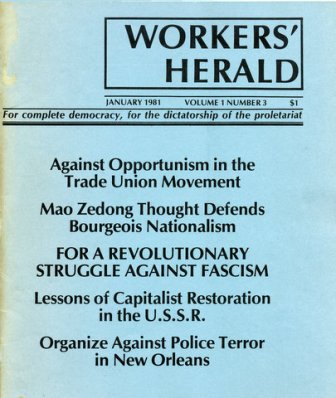
Introduction: Objectives of Workers’ Herald
RPO(ML) Resolution on Mao Zedong Thought
The Polish Working Class Stands up by Dennis Strawn
Drive Spies and Provocateurs Out of the Communist Movement by Harriet Parsons
Defeat Pacifism in the Anti-war Movement by Anne Fletcher
Capitalism: the Inevitable Product of Mao Tse-Tung’s “Decentralized Socialism” by Dennis Strawn
Against Opportunist Tactics in the Labor Movement by Louie Scrapper
Mao Zedong Thought Defends Bourgeois Nationalism
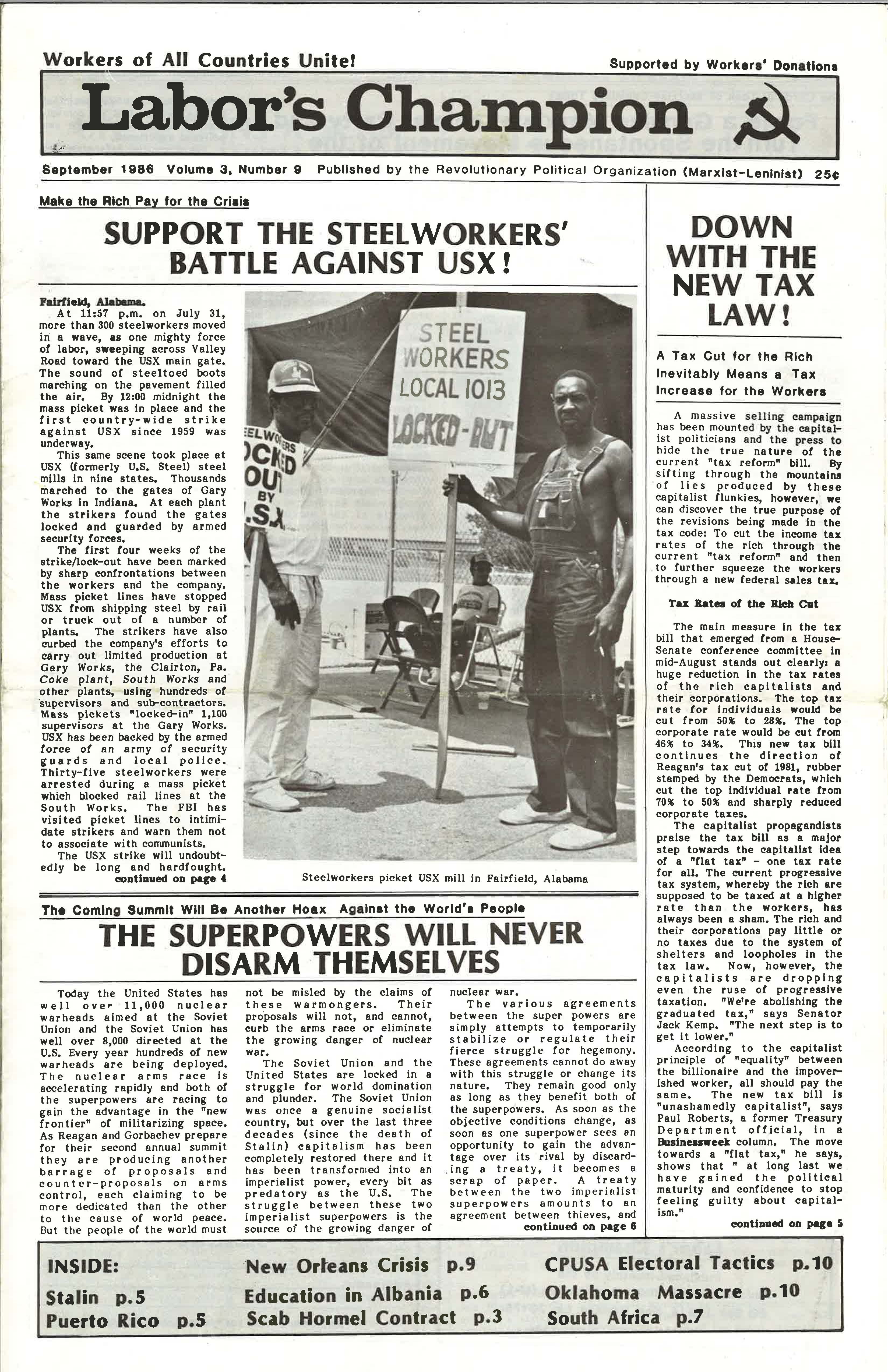
For a Revolutionary Struggle Against Fascism by Mark Evans
Lessons of Capitalist Restoration in the U.S.S.R. by Mark Evans
Let’s Go Forward, Not Backwards: Defeat Bourgeois Feminism in the Women’s Movement by Rosie O’Connell and Roosevelt Washington, Jr.
In Defense of the Right of Political Succession for the Afro-American Nation. Papers and Resolutions from the School on the Afro-American National Question, September 1982 by the Revolutionary Political Organization (M-L), Amilcar Cabral/Paul Robeson Collective and with the participation of the Red Dawn Collective
Social Classes in the United States
Self-Determination, the Right to Secession for the Diné (Navajo) Nation by Mark Evans and Charles Davis
Workers – Don’t Follow the CPUSA into the Arms of the Democratic Party
March 8: International Working Women's Day, March 1987
[Back to top]
Constitution of the San Diego Marxist-Leninist Group
The Road to Founding the New U.S. Marxist-Leninist Communist Party
A Schematic Look At, A Partial History of, The US Revolutionary Movement of the Last 25 Years [from Red Flag, Vol. II, No. 6, April 1985]
[Back to top]
The Committee for a Proletarian Party (CPP) was a local San Diego collective which formed in the Spring of 1977. It was active in a number of local struggles and participated in the New Communist Movement nationally by publishing a number of pamphlets on issues of strategy and party building.
In 1978 it drew close to the Marxist-Leninist Organizing Committee and joined with it to create the Communist Party U.S.A./(Marxist-Leninist) that same year. However, a number of members soon left the CPUSA (M-L) over its pro-Albania positions and rejection of Mao Zedong’s contribution to Marxism-Leninism and reformed the CPP. Pre-1980 documents of earlier CPP can be found here.
In 1980 the CPP merged with the Chicagon Committee for a Communist Party, which had also come out of the CPUSA(M-L). In 1983 the CPP merged with the Communist Organization, Bay Area (COBA) to form the Organization of Revolutionary Unity (ORU).
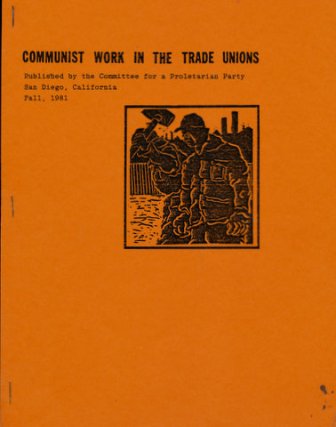
Party-Building Statement of Committee for a Proletarian Party
The NASSCO Workers Struggle: For a Fighting Union–A Communist Perspective
Communist Work in the Trade Unions
Line of March: Apologist for “Martial-Law Socialism”
The Cultural Revolution in China: Lessons from Class Struggle Under Socialism
[Back to top]
The Organization for Revolutionary Unity has its origins in The Communist Organization, Bay Area and the Committee for a Proletarian Party.
The Communist Organization, Bay Area (COBA) was formed in 1981 from a merger of two groups: (1) XMLC (ex-members of the Marxist-Leninist Collective) and (2) A. Green/BR Johnson. The Marxist-Leninist Collective (MLC) (1975-1978) was a relatively large collective in the Bay Area which worked in local shipyards and other sites. XMLC, which included most of the original leadership, resigned from MLC in 1978 over differences on party building line, citing the need for serious study in order to form a principled basis for unity. A. Green/BRJ was a small collective; 2 members had been in the GI support movement and 2 were coauthors of the book, On the Roots of Revisionism, which arose out of a study group on the history of the communist movement from 1917.
A. Green and XMLC felt that serious study of the communist movement and its history was essential to avoid the pitfalls of groups which were rushing to form parties (chiefly, CLP, RU, OL, and WVO). After a period of study and joint work, COBA was formed in 1981. COBA then entered joint work and study with the Committee for a Proletarian Party (CPP), which was based in San Diego. COBA and CPP merged to form the Organization of Revolutionary Unity (ORU) in 1983. ORU underwent yet another detailed merger process with the Proletarian Unity League (PUL) and in 1986 joined the newly formed PUL/RWH organization Freedom Road Socialist Organization (FRSO).
ORU Dissolves [from MIM Theory, Nos. 5-6, 1987]
The Nature of Soviet Society [published version with questions and answers]
Notes on the Establishment of State Capitalism in China Post-1976
Working Women and the Struggle for Women’s Liberation
The Decline of the RCP: A Polemic by the Organization for Revolutionary Unity
ORU Merges into Freedom Road Socialist Organization
[Back to top]
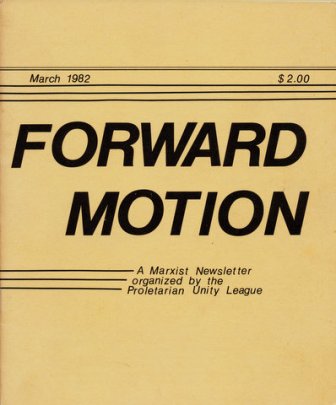
Preliminary Views on Revolutionary Work in the Afro-American People's Liberation Movement by the PUL Nationalities Commission
Kampuchea, Self-Determination and the “Boat People”: The Challenge for Socialism
1980 Elections: Labor Locked Out
El Salvador: U.S. On Wrong Side
Exchange with the Marxist-Leninist League on the Trade Union Question
The Draft: Part of the Problem–Not the Solution
Poland: The Struggle Continues
The Proletarian Unity League: Where We Came From, What We Look Like, What We Do by the PUL Unity Work Team
The tax attack in Boston: Lessons of the battle against Proposition 2 1/2
How To Think About The Soviet Union by Ben P.
Sum-Up of a Strike in a Municipal Hospital: Getting Out From Between a Rock and a Hard Place by Nadine M. and Wilma C.
A Response [to the Sum-Up of a Strike in a Municipal Hospital] by the Revolutionary Workers Headquarters
Building The Black United Front
Electoral Politics and the Left Today: Fighting the Defensive Battle by Jonathan H.
Political Action in the Labor Movement: Beyond “Trench Warfare” by David S. for the Trade Union Commission, PUL
Opposing Nuclear Arms: Notes From a Marxist Perspective by Nadine P.
Labor’s Survival/Labor’s Revival. Working Papers on the Trade Unions Edited by Susan Cummings & Jonathan Hoffman for the Trade Union Commission of the Proletarian Unity League
[Back to top]
Socialist Organizing Network Unity Statement
Freedom Road Socialist Organization – An Introduction
“Maoists” to our right: FRSO’s “Principles of Unity, 1985” [from MIM Theory, Nos. 9-10, 1987]
Freedom Road Socialist Organization: Democrats’ Loyal Maoists from Workers Vanguard
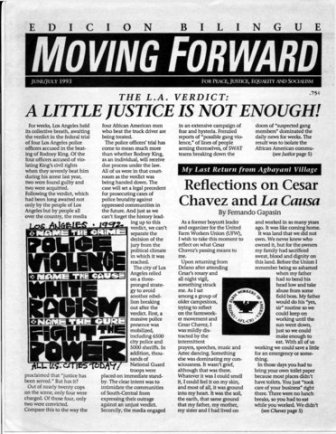
The Left and Jesse Jackson by Freedom Road Socialist Organization, National Executive
Challenging Eurocentrism by Juliet Ucelli and Dennis O’Neil
A step toward unity: Freedom Road Socialist Organization & Socialist Organizing Network Join Forces
Freedom Road Socialist Organization – Unity Statement
ORU Merges into Freedom Road Socialist Organization
Meeting the Challenge of Crisis and Opportunity: Left Refoundation and Party Building
NEC Response to Left Refoundationist Proposal
Freedom Road Socialist Organization Loses Two Districts in Split
Public Statement on the Future of FRSO
Brick by Brick: Building a Movement to Free Mumia Abu-Jamal
FRSO’s Strategy for a New Historical Period Adopted at the Freedom Road Socialist Organization’s 2003 Congress
The Crisis within the Left: Theory, Program, Organization by Badili Jones
Which Way is Left? Theory, Politics, Organization and 21st Century Socialism
The Life of the Party: Thoughts on What We Are Trying To Build by Khalil Hassan
Unity Statement of Freedom Road Socialist Organization
Freedom Road Socialist Organization: 20 Years of Struggle
FRSO’s 4th Congress: Building on Success, Preparing for the Future [2004]
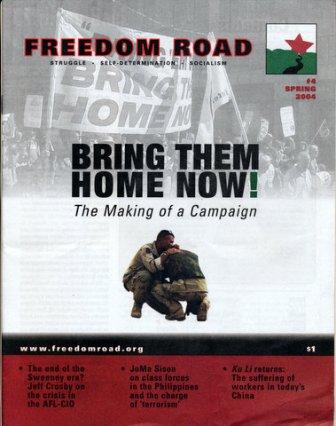
FRSO’s 4th Congress: Main Political Report
Unity Statement on National Oppression, National Liberation and Socialist Revolution
Fifth Congress of Freedom Road Socialist Organization: “Advance in a new period of struggle” [2007]
Fifth Congress of Freedom Road Socialist Organization: Main Political Report
FRSO Program: Class in the U.S. and Our Strategy for Revolution
6th Congress of Freedom Road Socialist Organization: Main Political Report
* * *
Build a Fighting Workers Movement
On the Student Movement in the U.S. by Josh Sykes
Looking Back at Tianamen Square. The Defeat of Counter-Revolution in China by Mick Kelly
The consolidation of Line of March coincided with the general decline of the New Communist Movement. In 1980, it was positioned firmly in the “antirevisionist, antidogmatist trend” of the NCM. It was already turning its critique of the NCM’s “dogmatism” and “left opportunism” to the nominal influence of Maoism in the trend and the broader left. Its identification with Cuba, Vietnam, and the successful Marxist-led liberation movements in Africa and Latin America (and the Pathet Lao in Laos and the Vietnamese overthrow of the Khmer Rouge in Kampuchea) was leading to a reassessment of the question of Soviet “revisionism.”
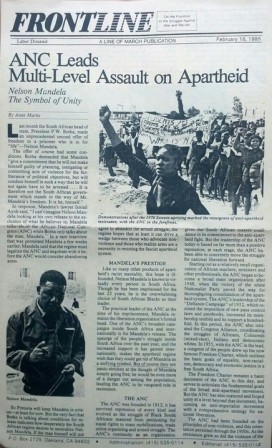
LOM was one group among many in the Bay Area, but its influence and numbers there were growing. They had stable and effective units in Los Angeles, Seattle, New York, Boston and Washington DC. New recruits and transferred cadres were laying down roots in the Midwest. The start of the decade saw the collapse of the OCIC and its flagship group PWOC, which had been the key focus of LOM’s party building work for years. Some of the most experienced members of OCIC joined LOM. The group’s influence was felt in solidarity work nationally, and the Bay Area women’s movement in particular. Ties between LOM and KDP tightened.
In short order, LOM’s Oedipal attack on Maoism, and its antagonism with the “fusion” proponents in the trend, were no longer strategic concerns. China had ceased to even try to act as a rallying point for revolutionaries, while the revolutions in Nicaragua, Grenada and Iran were divorced from the world views that had hardened among the three conflicting strains of the NCM – followers of Deng, Hoxha, and the Gang of Four. LOM, by contrast, energetically supported the new revolutions; had skills in coalition-building gained from the experience of KDP, the International Hotel struggle in San Francisco, and the National Coalition to Overturn the Bakke Decision, and was not plagued by the internal breakdown that characterized some of the larger, seemingly similar non-NCM groups in the early 80s, such as SWP and DWP.
By the end of 1983, LOM had a biweekly newspaper; an established theoretical journal; several years’ experience developing and teaching political education curricula and systematically training cadres; and contacts with like-minded parties internationally. The paper, Frontline, while no competition for the Guardian – which it resembled, since editor Irwin Silber had been a strong presence at both papers – enjoyed a relatively broad readership for a party organ. LOM’s various “transmission belt” groups (“revolutionary mass organizations”) were guided by the central group’s United Front Against War and Racism strategic framework, though they did not promote it.
In the years that followed, LOM’s orientation shifted. Since the struggle over “party building line” had been settled by default, and some progress had been made in elaborating the contours of a “rectified general political line,” LOM more and more acted as a self-defined party (in far left terms), despite its tiny numbers and unstable footing in mass arenas.
LOM turned its attention to debate with the CPUSA and the social democratic-leaning left, the two key actors in their hypothetical United Front framework. Their goal was to shape the orientation of the broader left, while refocusing CP and DSA towards the viability of a permanent front which would include LOM.
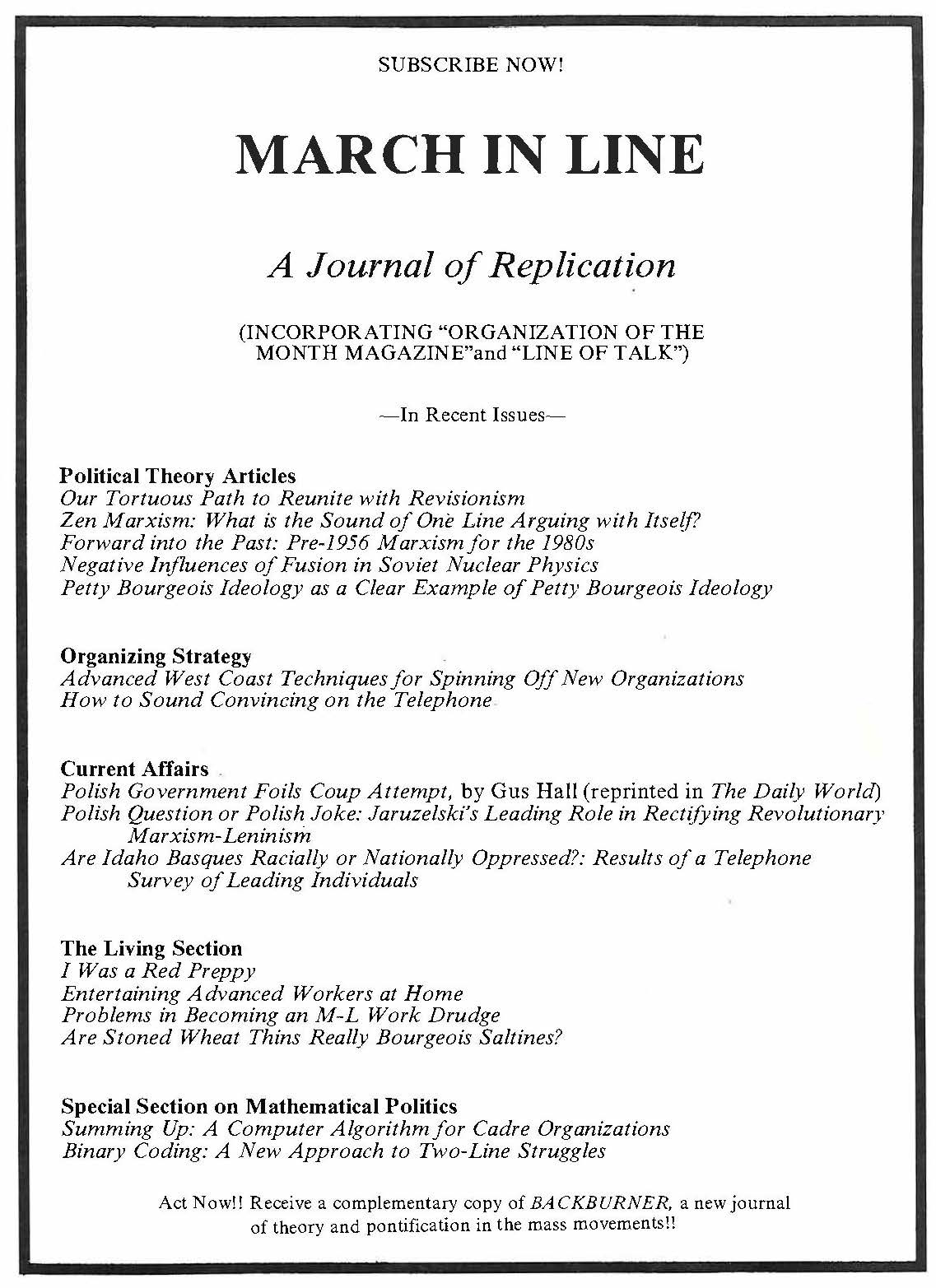
LOM targeted the CP’s “official optimism” – the tendency to view every development as a win, or a potential win. They also challenged the CP’s longtime conviction that “Labor (specifically the AFL-CIO) must lead” the general progressive movement. On questions regarding the Soviet Union, LOM began to stake out positions more openly and fiercely pro-Moscow than even the CP was prepared to take, from martial law in Poland to the Chernobyl disaster. Debates with the DSA/Dissent journal tendency focused on anti-Sovietism, which was most pronounced among veterans of the 1960s Socialist Party milieu.
LOM, unlike CP and DSA, saw the development of the Black Liberation Movement into local struggles for black political empowerment as the cutting edge of progressive politics in the 80s. All three groups supported the successful mayoral campaigns of Harold Washington in Chicago and Coleman Young in Detroit, along with those of many other progressive black Democrats for local and federal office. LOM, however, saw in them the principal battlegrounds against racism and Reaganism. A popular front orientation emerged, including viewing the Democratic Party itself as an arena of struggle, and LOM readily joined Jesse Jackson’s presidential primary campaign in 1984, along with various other left groups. CP and DSA were reticent, leading to further debate over the centrality of white supremacy and black oppression, and political motion in the black community, in the progressive agenda.
After the 1984 Democratic primary, LOM made its first call for support of a “lesser evil” – the disastrous campaign of Walter Mondale. LOM based its decision on the bitter toll of Reaganism on progressive constituencies, not on any newfound sympathy for center-right Democrats. This was repeated in 1988, when LOM rallied to Jackson (this time joined by CP and DSA), then worked for Michael Dukakis against George H.W. Bush.
In the presidential campaigns, the group bloced with other socialist groups in the left wing of the Jackson campaign, most of whom shared aspects of LOM’s anti-racist orientation. But it did not enter the Democratic Party in any ongoing way between 1984 and 1988. It tried to develop its influence in the black community, in the struggle to confront the AIDS crisis, and in unions, but without notable success.
In the midst of this turn, LOM began its fatal decline. Members dropped away, with a particular attrition of people of color. KDP was jolted by the 1983 uprising in the Philippines, only to break with the CPP over the latter’s decision to boycott the “snap election” that ended the Marcos dictatorship. Theoretical production went by the wayside. Supervision of day to day work became more and more bureaucratized.
After Jackson’s second run in 1988, he folded his campaign, leaving his activist supporters confused and demoralized. The rise of Glasnost and Perestroika brought a new wave of hopefulness, and LOM became Gorbachev’s most vocal advocate in the US left – a seemingly unlikely turn given their previous promotion of left-of-Moscow orthodoxy, yet characteristic of the LOM leadership’s history of grappling with doctrinal contradictions in changed circumstances. But it soon became apparent that 20th century socialism was imploding, from the crackdown at Tiananmen to the failed coup that ended the Soviet Union.
A personal crisis incapacitated LOM’s most influential leader, Bruce Occeña, and a split followed. The majority of the group took up an internal campaign of “Re-examination, Redirection and Democratization,” during which most of LOM’s integral premises were questioned, and often found wanting – most significantly, the Marxist-Leninist party model. In 1989 LOM transformed itself into a looser group, Frontline Political Organization, but it was unsustainable. FPO disbanded, merging Frontline with another Bay Area-based publication, North Star Review, to launch CrossRoads, a magazine sponsored by a wide range of left activists from formerly warring tendencies. It ran from 1990 to 1996.
The Myth of Capitalism Reborn: A Marxist Critique of Theories of Capitalist Restoration in the USSR by Michael Goldfield and Melvin Rothenberg
The Marxist-Leninist Education Project: An Introduction
On Ideological Struggle by Gabriel, Mark and Marc [Rafael, Scott and Norton]
Letter on the Expulsion of Gabriel and Marc from the Bay Area MLEP
Letter from the National MLEP to the Guardian and Theoretical Review urging them to not publicize the struggle in the Bay Area MLEP
Dirty Linen: The Struggle in the Bay Area MLEP by Rafael, Scott and Norton (Theoretical Review, Number 25, November-December 1981]
Letter criticizing the Theoretical Review for having published the article, “Dirty Linen: The Struggle in the Bay Area MLEP“ by the Line of March Editorial Board
Letter to Gabriel, Marc and Mark from the National MLEP on the publication of their article in the Theoretical Review
Response of Gabriel, Marc and Mark to the letter from the National MLEP on the publication of their article in the Theoretical Review
Line of March and the Anti-revisionist, Anti-“left” Opportunist Trend by Rafael, Scott and Norton
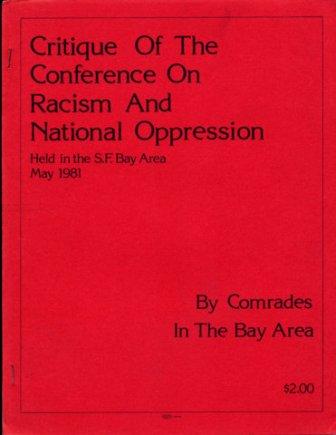
Call for a Conference on Racism and National Oppression
Mailgram from Bruce Occena to the Theoretical Review Editorial Board
Racial Oppression and National Oppression: Their Particuliarities and their Intersection Working Paper I, Parts I and II
The Communist Movement’s Relationship to the Struggle Against Racism Working Paper 2, Section I: Overall Theoretical Framework
The Communist Movement’s Relationship to the Struggle Against Racism Working Paper 2, Section II: The History of the Communist Movement and the Struggle Against Racism and Section III: The Trend and the Struggle Against Racism
Outline for Presentation on Filipino National Question
Outline for Presentation on the Hawaii National Question
Outline for Panel Presentation on the Black Nation Thesis
Outline for Panel Presentation #2: Critique of the Black Nation Thesis
Critique of the National Conference on Racism and National Oppression held in the S.F. Bay Area May 1981 by comrades in the Bay Area
Letter of invitation to a Bay Area Regional Conference on Racism and National Oppression and why certain groups are not being allowed to participate by the LOM Planning Committee
Why We Were Excluded from the Bay Area Regional Conference on Racism and National Oppression
Invitation to a Midwest Conference on Racism and National Oppression
Letter to the Theoretical Review on forthcoming article, “A Communist Proposal for a United Front Against War and Racism” by Bruce Occeana for the Line of March Editorial Board
A Communist Proposal for a United Front Against War and Racism by the Line of March Editorial Board
United Front Against War & Racism: Strategy for Resistance by the Line of March Editorial Board
Toward a Contemporary Strategy: Lessons of the 1930s by Paul Costello, Theoretical Review
Response to LOM’s Call for a “United Front Against War and Racism” [submitted for publication in the Guardian] by the Boston Theoretical Review Editorial Board
A Beginning Critique of the United Front Against War and Racism by Individuals from Bay Area Socialist Organizing Committee and the Crisis in Marxism Study Group
Line of March’s United Front Against War and Racism – Strategy for What? by Phil Thompson, Communist Workers Party
Line of March’s Strategy for resistance...A Critical Response by Ron Whitehorne, Philadephia Workers Organizing Committee
* * *
Letter from the Line of March Editorial Board to the Theoretical Review on LOM-TR Relations
Reply of the Theoretical Review Editorial Board to Line of March
* * *
Toward a Critique of the General Line of the CPUSA by Ralph Beitel and Bruce Occena
Which Way Out for Poland? Polish Workers Fight Revisionist Line, Part I, by Dennis T. Torigoe [Communist Workers Party]
Political Report to the Line of March Labor Commission First National Conference
Imperialism and Opportunism in the Labor Movement: The Labor Aristocracy in the United States Working Paper for the Line of March Labor Commission’s First National Conference
Racism – The Cutting Edge of the Bourgeois Offensive by the Line of March Editorial Board
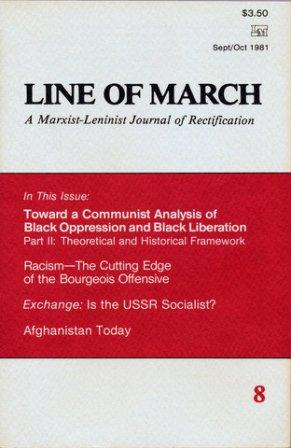
Line of March – Mouthpiece of Soviet Revisionism on the Cultural Revolution by Cynthia Lai [Communist Workers Party]
Line of March’s White Chauvinist, Anti-Worker Line on the African-American National Question by Phil Thompson [The 80’s, Vol. II, No. 2, Sept.-Oct. 1981 (theoretical journal of the Communist Workers Party]
Toward a Communist Analysis of Black Oppression and Black Liberation, Part I: Critique of the Black Nation Thesis; Part II: Theoretical and Historical Framework; Part III: Strategy by Linda Burnham and Bob Wing
The Defense of Women’s Rights in the U.S. Today by the Line of March Editorial Board
The International Communist Movement: A Reappraisal by the Line of March Editorial Board
Statement on the Situation in Iran by the Line of March Editorial Board
Turning Point in Poland by the Line of March Editorial Board
Poland and the struggle for power by Ralph Beitel, Line of March
Editorial Statement on Poland by the Theoretical Review
Line of March: Apologist for “Martial-Law Socialism” by the Committee for a Proletarian Party
The Nature of Soviet Society: Joint Presentation by the Committee for a Proletarian Party and the Communist Organization, Bay Area given June 10, 1982 in the Debate with the Line of March on Whether the USSR is Capitalist or Socialist
The Politics of Nuclear War and Nuclear Disarmament by the Line of March Editorial Board
Letter on LOM’s decision to “go-it-alone” on these conferences by Max Elbaum, Melinda Paras and Sharon Rose
LOM Conference Position Paper #1: The Trend’s Break with “Left” Opportunism
LOM Conference Position Paper #2: The Struggle Against Revisionism
LOM Conference Position Paper #3: The Trend’s Party Building Task
LOM Study Questions for Workshop #2: The Final Degeneration of Maoism
* * *
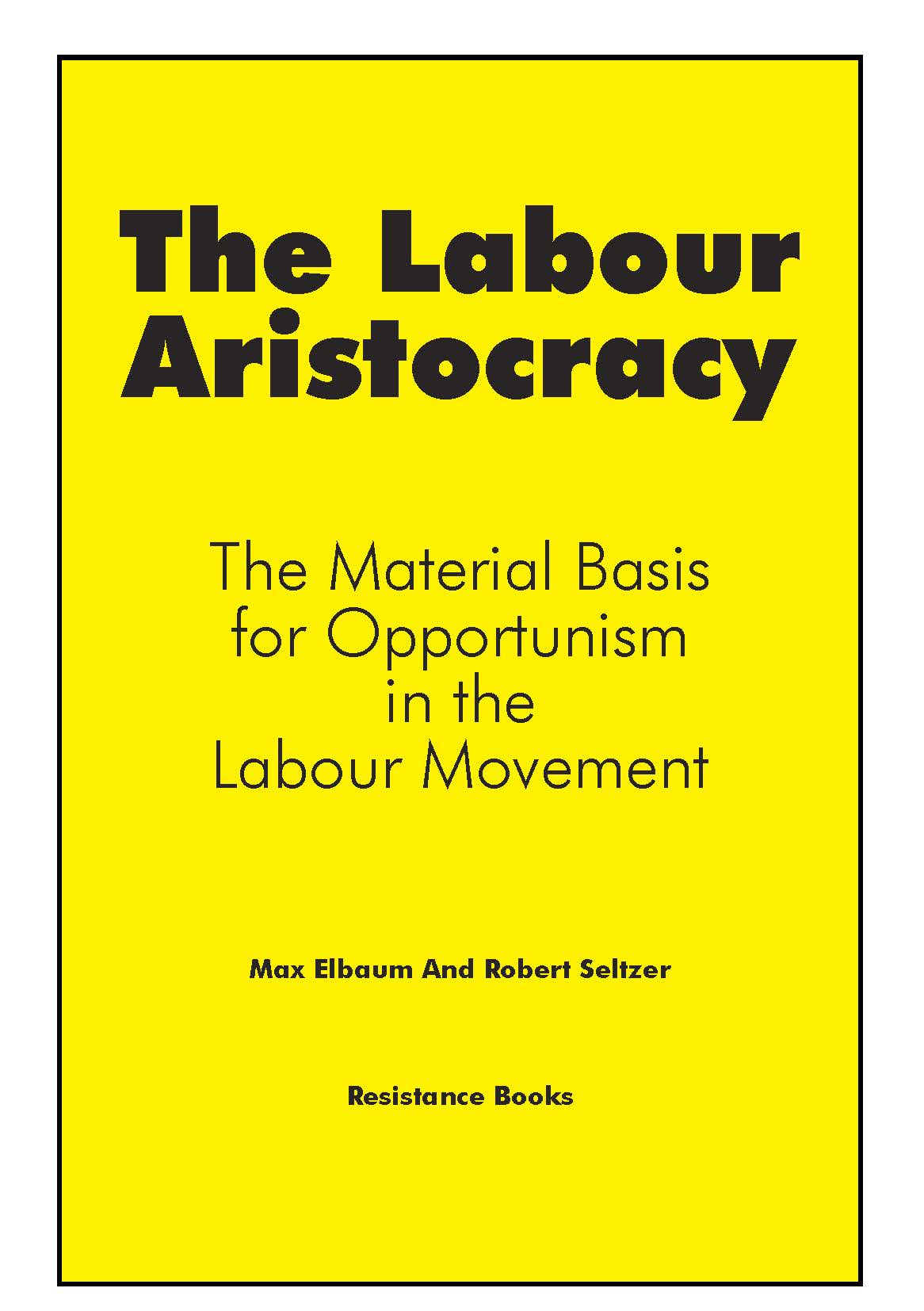
The Labor Aristocracy: The Material Basis for Opportunism in the Labor Movement, Part I: The Theory of the Labor Aristocracy; Part II: The U.S. Labor Movement Since World War II; Part III: The Polemic Within the Communist Movement by Max Elbaum and Robert Seltzer
See You on the Frontline... Every Two Weeks, Starting in June
The Soviet Economy. A Closer Look at the Debate and the Reality by Victor Uno
Fan the Flames: The Perils of “Official Optimism” by Irwin Silber
Spanish Communists Criticize Eurocommunism by Margie Rosden [Frontline, Vol. 1, No. 10, November 14, 1983]
CPUSA Convention: ’Dump Reagan, Build a Mass Party of Action’ by Bruce Sato and Robert Sellers
CPUSA’s Official Optimism Rooted in Its Political Line by Max Elbaum [Frontline, November 28, 1983]
Frontline Debate with the Guardian on the USSR and the downing of South Korean Air Lines Flight 007
Washington’s Offensive: Out of the Talking Stage by Irwin Silber and Victor Uno
Frontline Debate with the CPUSA on Reagan and the Vietnam Antiwar Consensus
Daily World vs. Frontline: White Racial Privilege: Bourgeois Myth Or Material Basis for Opportunism?
Frontline Editorial: Yuri Vladimirovich Andropov
Left Social Democracy Searches for a Program by Jack Fletcher and Ethan Young
Deng Xiaoping’s Dilemma by Doug Ward
Exchange on the CWP and Greensboro in Frontline
Frontline Editorial: One Year Down, As Long As It Takes To Go
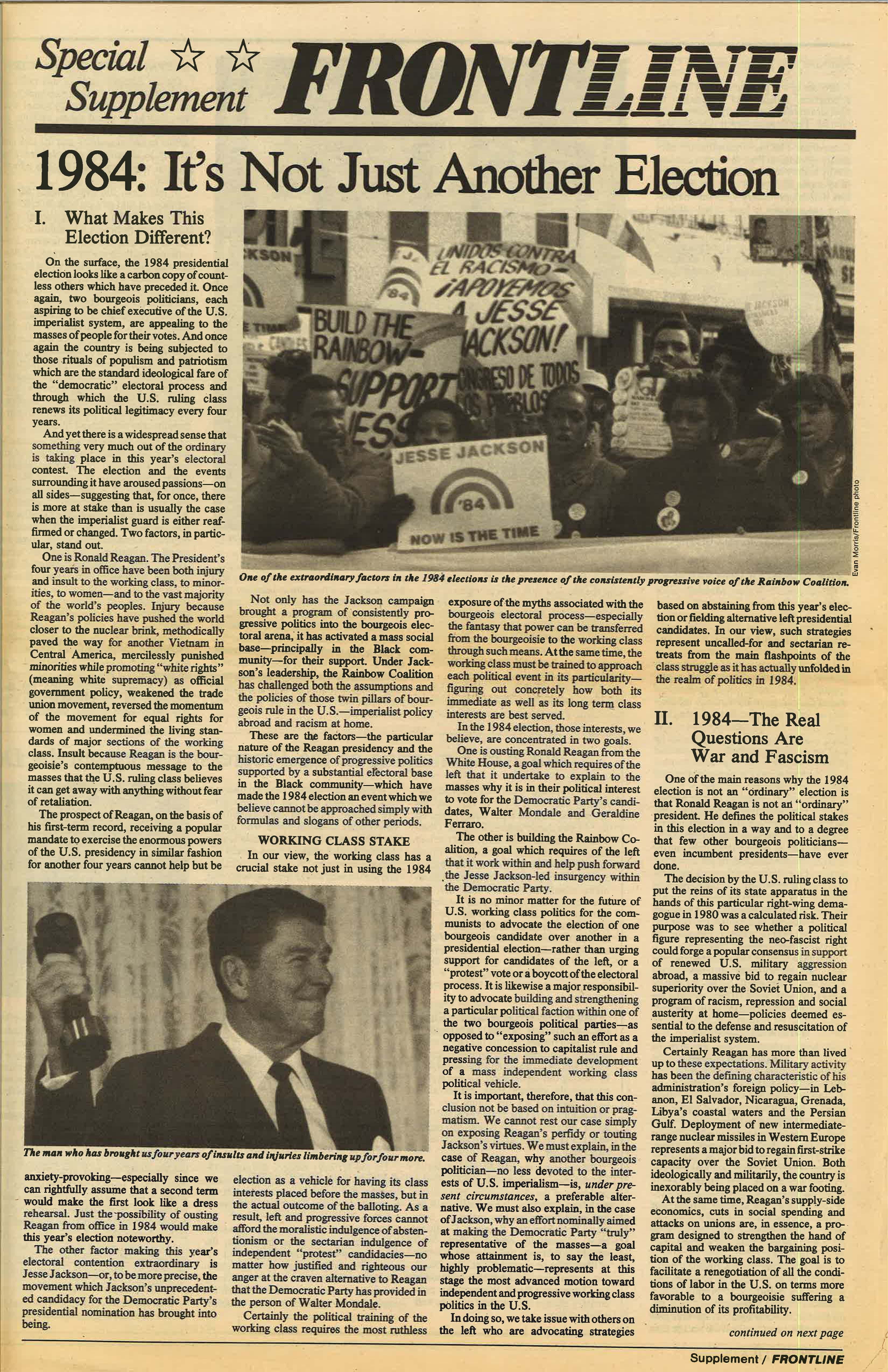
A Black Presidential Candidate? by Frances M. Beal
Jackson’s ’Rainbow’ Politics Move Center Stage by Frances M. Beal
The Jesse Jackson Candidacy: A New Political Force in the Electoral Arena by Frances M. Beal
Frontline Editorial: The Challenge to the Left in the 1984 U.S. Election
What Kind of Demonstrations This Election Summer? by Melinda Paras
Frontline Editorial: Hounding of Jackson Tests the Rainbow
The New Motion in Black Politics and the Electoral Arena by the Line of March Editorial Board
Rainbow Readies for San Francisco and Beyond by Frances M. Beal
After the Convention Storms... the Rainbow Comes Out Fighting by Frances M. Beal
1984: It's Not Just Another Election Frontline Special Supplement, August 20, 1984
The 1984 Elections and the Black Community by Linda Burnham and Phil Gardiner
Interview with Jack O’Dell: Reflections on the Rainbow – Past, Present and Future
What did the revisionists conclude from their fiasco in the elections? by the Marxist-Leninist Party
* * *
Frontline Editorial: What Will Revitalize the Labor Movement?
China Goes to Market by John Jackson
’Black Bolshevik’ Harry Haywood Dies at 87 by Frances M. Beal
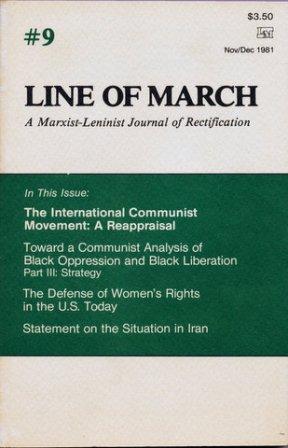
Huber Matos and the Maoist Dilemma by Irwin Silber
A response to another Frontline attack: Who is “unreliable” in the U.S. anti-intervention movement? by Sarah Johnston [Unity newspaper]
CPUSA’s Platitudes Won’t Win the Fight Against Racism by Linda Burnham
How Secure Is China’s Socialism? by Irwin Silber
Maoism’s Latest Farce: The CWP Goes Shopping for American Express by Max Elbaum
Frontline Editorial: Some Straight Talk on Terrorism
Polish Elections: Solidarity Boycott Fails by Tom Angotti
Ten Years of Building a Marxist-Leninist Trend by Max Elbaum
Social Democracy’s Dilemma: DSA Stalled As Democrats Veer Right by Tim Patterson
Fighting sectarianism in the U.S. anti-apartheid movement by Karega Hart [Unity newspaper]
U.S. Maoists Desperate to Undermine Solidarity with ANC by Phil Gardiner
Fighting for Working Class Politics In the Women’s Movement: Alliance Against Women’s Oppression Holds Second Congress by Linda Kahn
Kampuchea: The Revolution Rescued by Irwin Silber
Frontline Editorial: Rainbow’s Promise and Challenge
Frontline Editorial: The Rainbow, ’New Directions’ and the Democratic Party
The Rainbow and Electoral Activism by Linda Burnham
CPUSA Launches People’s Daily World by Max Elbaum
A Disappointing Performance [on the CP’s response to his previous column] by Max Elbaum
Notes on the class struggle and communist practice [Issue #3 of the Activists’ Bulletin of Line of March]
Poland’s Prisoner Release Signifies ’Solidarity’ Decline by Tom Angotti
’Marxism in China Today’ – You’d Better Be Sitting Down by Max Elbaum
Guardian’s Out-of-Date Nostalgia for Mao by Max Elbaum
Internationalism vs. LOM’s left-wing chauvinism by Sarah Johnston [Unity newspaper]
What’s New – And What Isn’t – in China, Part One, Part Two by James Irons
Party Shakeup Underway in China by James Irons [Frontline, Vol. 4, No. 15, February 2, 1987]
CPUSA Prepares for 24th Convention by Max Elbaum
CPUSA’s Sectarian View of the U.S. Left by Max Elbaum
The Case of Bernhard Goetz by Linda Burnham and Letisha Wadsworth
Toward Revolutionary Caricature [on the Spartacist League] by Max Elbaum
On the DWP’s Demise: What Leninism Is and Is Not by Max Elbaum
Latest Issue of Activists’ Bulletin Focuses on CPUSA-Line of March Contention by Max Elbaum
U.S. Left Responds to Gorbachev Reforms by Max Elbaum
Perestroika: ’Historic Impulse Flowing Out of Socialist System’ by Irwin Silber
Glasnost must seek origins of present crisis in Soviet history by Paul Costello
Revolution Within Socialism – The Economics of ’Perestroika’ by Irwin Silber
The Democratization of Socialism: ’Glasnost’ by Irwin Silber
’Perestroika’ and the Challenge of Democracy by Irwin Silber
Impact of Perestroika on the U.S. Left by Irwin Silber
The Need to Confront History [review of the Soviet film ’Repentance’] by Tom Angotti
Letter to Frontline on “Repentance” Review and Stalin
Angotti Response to letter on “Repentance” Review and Stalin
Letters to Frontline on Stalin
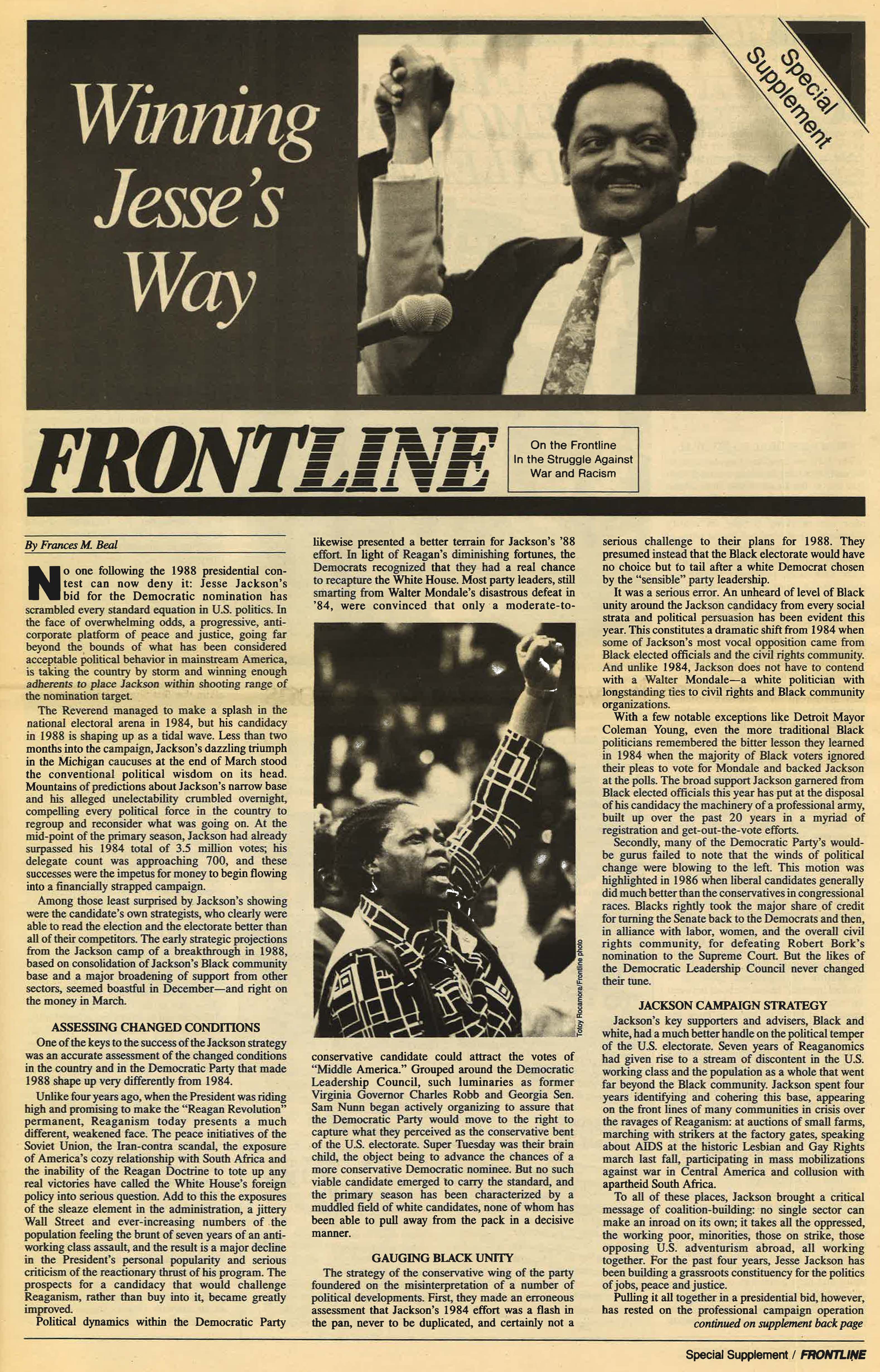
DSA Debates Position on the Rainbow by Max Elbaum
Democratic Socialists Debate Jackson Candidacy by Max Elbaum
Winning Jesse’s Way Frontline Special Supplement [April 11, 1988]
New Alliance Cult Trying to Appropriate Rainbow Banner by Max Elbaum
NAP’s Two Roads Are Not Better Than One by Max Elbaum
Rainbow Restructures by Gerald Lenoir [Frontline, Vol. 6, No. 19, March 27, 1989]
Despite New Rules, Build the Rainbow by Gerald Lenoir
Consolidating an Activist Rainbow by Linda Burnham
* * *
Strikes in Poland: Resistance to Reform by Tom Angotti
Frontline: Backing Dukakis Comes with the Territory
Letter to Frontline on its Dukakis endorsement
Left lukewarm about Dukakis by John Trinkl
The Left and the Election by Max Elbaum
CPUSA 24th National Convention: CPUSA General Secretary Questions Relevance of Left-Center Alliance by Max Elbaum
It’s an Emergency! [Fund Appeal] [Frontline, Vol. 6, No. 23, May 22, 1989]
Mark Rudd’s Self-Criticism by Max Elbaum
’No Mercy’ for China’s Democracy Movement by Max Elbaum
China Crackdown Sparks Diverse Response in World Communist Mv’t by Max Elbaum
Tiananmen: How Should The U.S. Left Respond? by Stan Woods
Huey: Black Community Has the Final Word [on the death of Huey P. Newton] by Frances M. Beal [Frontline, Vol. 7, No. 6, September 25, 1989]
Linda Burnham Letter to Frontline on Huey Newton
Poland Vote: Chapter One in Socialist Pluralism by Tom Angotti
Letter to Frontline on Eastern Europe coverage
Soviet Nationalities in Turmoil by Fred Weir
Facing Worker Mistrust, Polish Government Resigns by Tom Angotti
Democracy Demonstrations Crash GDR Party by Stephen Castor
GDR Demonstrators: ’We Want Socialism, But a Different One’ by Stephen Castor
Ten Days that Shook the Wall [on the fall of the Berlin Wall] by Stephen Castor
’I Didn’t Think We’d See This in Our Lifetime’ [on the fall of the Berlin Wall]
Line of March Reviews Its Line and Practice by the Line of March National Executive Committee
Sweeping ’ultra leftism’ out of the Line of March by John Trinkl
Line of March’s Debate Over Ultra-Leftism and Party Building
Frontline Editorial: Line of March Sums Up and Transforms
The Transformation of Line of March
The Left in a Changing World by the Frontline Political Organization
Frontline Editorial: Toward a Better Frontline
Frontline Editorial: See You in January [Frontline, Vol. 7, No. 10, November 27, 1989]
Frontline Editorial: Sorting Things Out
* * *
Introducing Crossroads [Crossroads, No. 1, June 1990]
Socialist Upheaval and Its Meaning for the U.S. Left [Presentations at the July 7, 1990 Conference, Berkeley, California]
Does disaster loom for Soviet economy? by Irwin Silber
U.S. leftists feel winds from East and reflect... by John Trinkl
Socialism: What Went Wrong? by Irwin Silber
Tallying the Balance Sheet, Max Elbaum reflects on Crossroads’ journey to see what can be learned from the experience [Crossroads, No. 62, August 1996]
[Back to top]
Statement on the Division in M.I.N.P.-El Comité
[Back to top]
The Communist Labor Party continued to soldier on through the 1980s, but its failure to grow in size or influence led it to reconsider the Marxist-Leninist form of organization as suitable for revolution in the United States on the eve of the 21st Century. As a result, in January 1993, the Communist Labor Party was disbanded. The National Organizing Committee (NOC) was formed in its place, which subsequently became the League of Revolutionaries for a New American (LRNA). This organization still exists.
The Centrality of the Black Worker by Jim Haughton and Joe Carnegie [Appeal to Reason, Vol. 5, No. 3, Autumn 1979]
The Centrality of the Black Worker [Reply] by Sheridan Talbott [Appeal to Reason, Vol. 6, No. 1, Summer 1980]
The Strategy and Tactics of the CPUSA and the CLP in the Trade Unions: A Comparison by Anna Magnani [Appeal to Reason, Vol. 5, No. 3, Autumn 1979]
Communist Work as a Trade Union Official by Lynn Morrison [Appeal to Reason, Vol. 5, No. 3, Autumn 1979]
The State of the Dictatorship of the Proletariat in China by Steven Miller [from Appeal to Reason, Vol. 5, No. 4, Winter 1979-1980]
The Dialectics of Chicano Political Development: A Political Economy Perspective by Richard Santillan [from Appeal to Reason, Vol. 5, No. 4, Winter 1979-1980]
A Critique of the Communist Party USA’s “Struggle for Afro-American Liberation” by Willie Baptist [Appeal to Reason, Vol. 6, No. 1, Summer 1980]
The Road to Socialism: Documents, Third Party Congress, Communist Labor Party, November 1980
Documents of the Fourth Congress of the Communist Labor Party (November 1986)
African American Liberation and Revolution in the United States by Nelson Peery
Entering an Epoch of Social Revolution by Nelson Peery
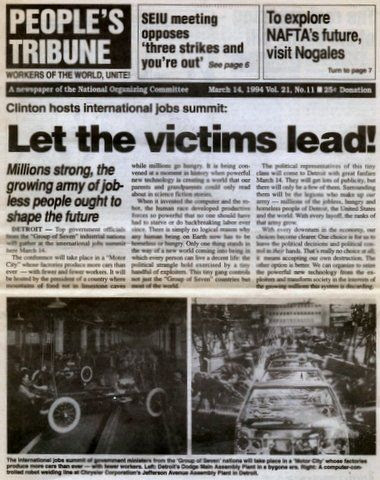
Call to Form Organizing Committees...
A Program of Action and Education [founding convention]
When Economic Change is the Foundation For Social Injustice, A Revolution is Inevitable by Nelson Peery [founding convention]
The NOC Needs a Permanent Name!
Editorial: NOC Celebrates One Year of Struggle
Call for a Second Convention of the National Organizing Committee
Draft Program of the NOC for Its Second Convention
Draft Political Resolution [for the Second Convention]
’Changing with the Times’: Draft Resolution on Organization [for the Second Convention]
Revolutionaries for a New America
A Convention to Reclaim America [from the founding convention]
What is the League of Revolutionaries for a New America?
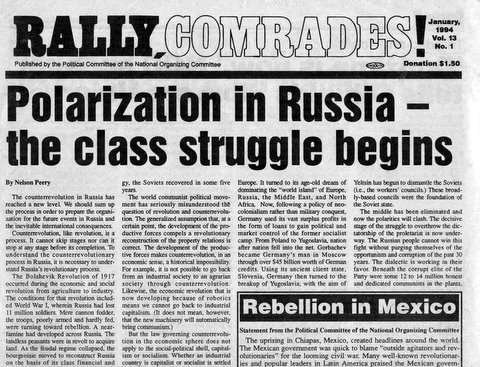
Political Report of the Steering Committee (1995)
On Being ’History’s Ruby’: How and Why We Must Build an Organization of Revolutionaries by Brooke Heagerty
Political Report of the Steering Committee (1996)
Revolutionary Change in America by Nelson Peery
Political Resolution [of the 3rd League Convention (1998)]
Organizational Resolution [of the 3rd League Convention (1998)]
The Program of the League [of the 3rd League Convention (1998)]
Political Report of the Steering Committee (July 1999)
Political Report of the Steering Committee (November 1999)
The Future is Up to Us. A Revolutionary Talking Politics With the American People by Nelson Peery
Program of the League of Revolutionaries for a New America [From the 8th Convention of the League of Revolutionaries for a New America, June 2014]
Political Resolution [From the 8th Convention of the League of Revolutionaries for a New America, June 2014]
The Future is Up to Us. A Revolutionary Talking Politics With the American People by Nelson Peery [second edition]
The most revolutionary weapon: An interview with Nelson Peery
General G. Baker, Jr. September 6, 1941-May 18, 2014, [Rally, Comrades!, July-August 2014]
General Gordon Baker, Jr.: Evolution of a Revolutionary, [Rally, Comrades!, September-October 2014]
Nelson Peery: American Revolutionary. June 22, 1923-September 6, 2015, [Rally, Comrades!, November-December 2015]
Rally, Comrades!
[Back to top]
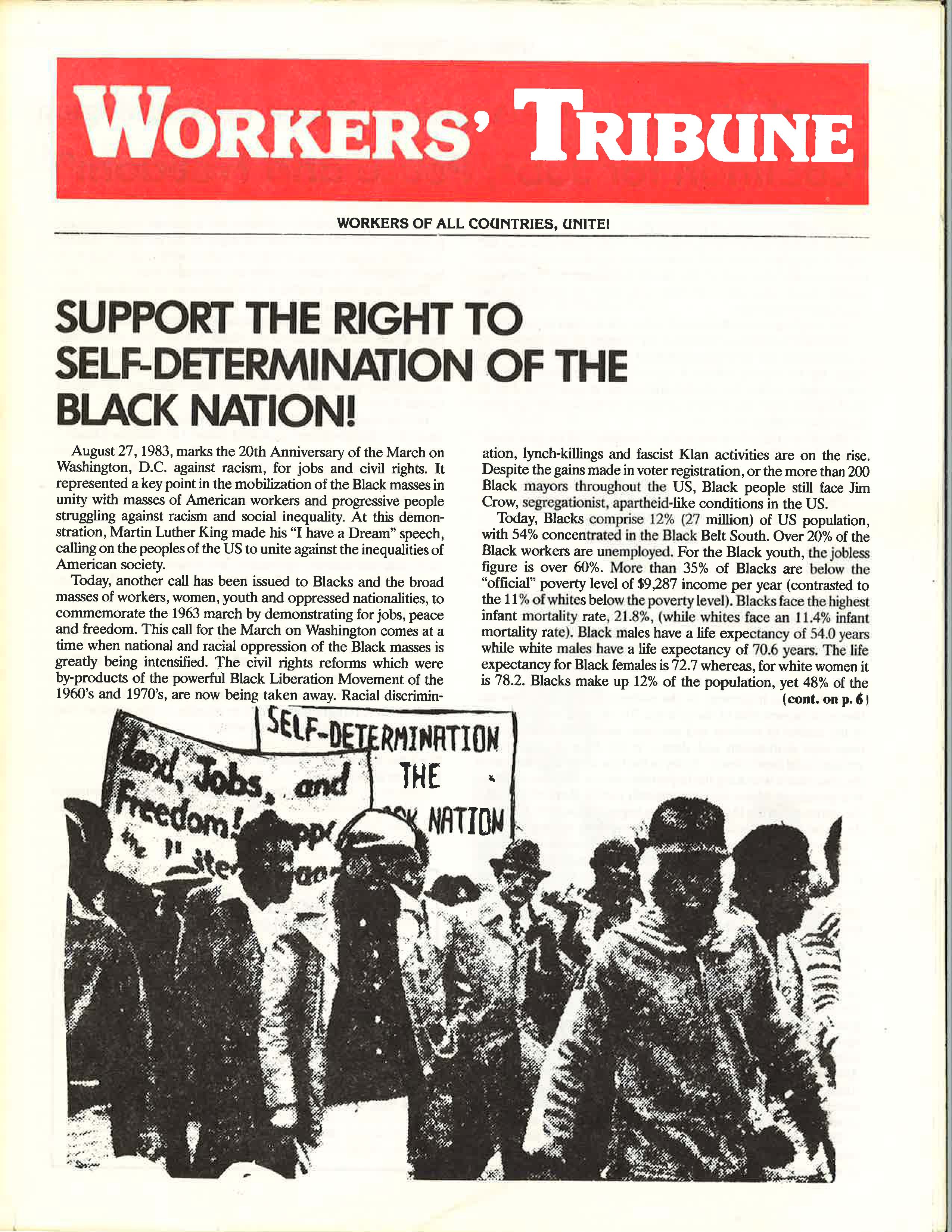
The Road to Working Women’s Emancipation
The Polish Workers’ Movement and “Red” Imperialism
The Collapse of the American Workers’ Movement [Workers’ Tribune, No. 2, April-May 1981]
Cuba: The Second Revisionist Congress of the “Communist” Party [Workers’ Tribune, No. 2, April-May 1981]
Interview: “Chiang Ching is a Racist!”
Special Workers’ Tribune Supplement: War and the Tasks of Labor
The Importance of the Black National Question and the Struggle Against National Chauvinism
Support the Right of Self-Determination of the Black Nation!
[Back to top]
In Support of the Struggle of the Party of Labor of Albania Against Revisionism
The U.S.-China Alliance and the Question of the Main Enemy
Once Again in Support of the Struggle of the Party of Labor of Albania against Revisionism
The Polish Workers Uprising and the Question of the Main Enemy
Revolutionary Organization of Labor, USA is Born!
[Back to top]
In the early 1980s, the New Voice group, which had long published a periodical called The New Voice, changed its name to the League for a Labor Republic (LLR), while continuing to publish The New Voice.
About the LLR [The New Voice, Vol. X, No 13, February 15, 1982]
Letters Ask about LLR Changes [The New Voice, Vol. X, No 13, February 15, 1982]
Polish People Can Win [The New Voice, Vol. X, No 13, February 15, 1982]
Poland and the Politics of the Two Superpowers [The New Voice, Vol. X, No 13, February 15, 1982]